English as a GLOCAL language World Englishes

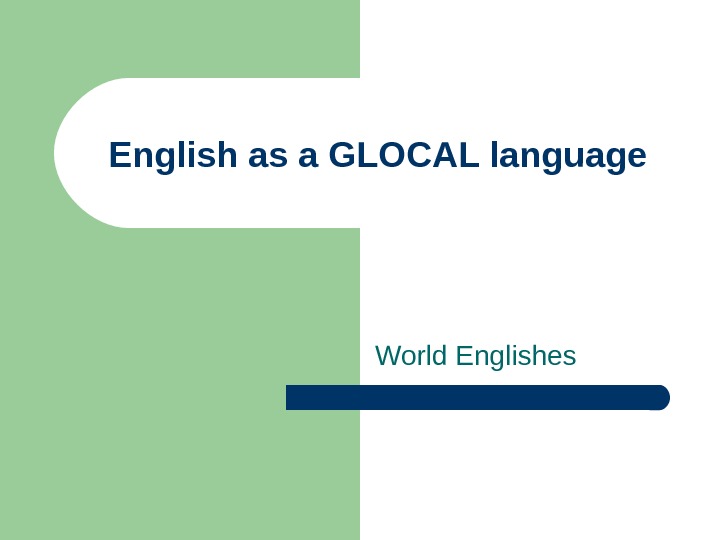
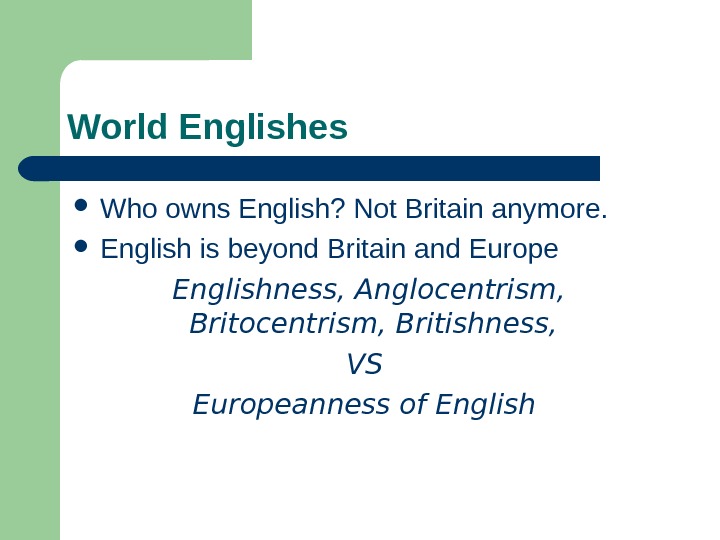
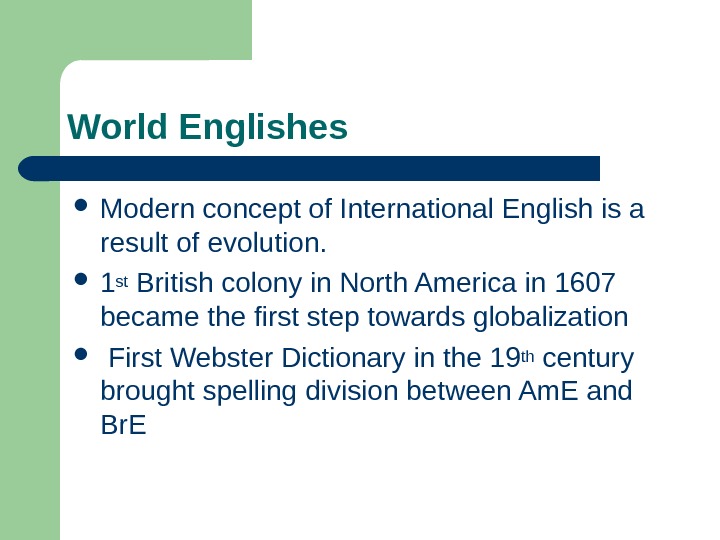
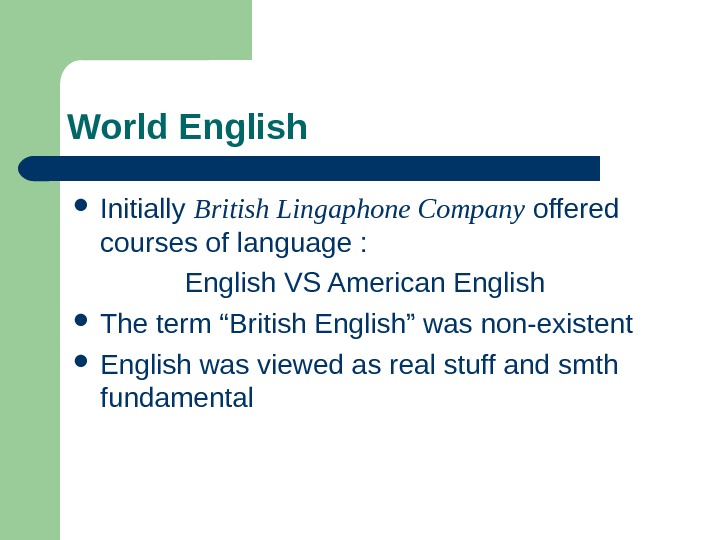
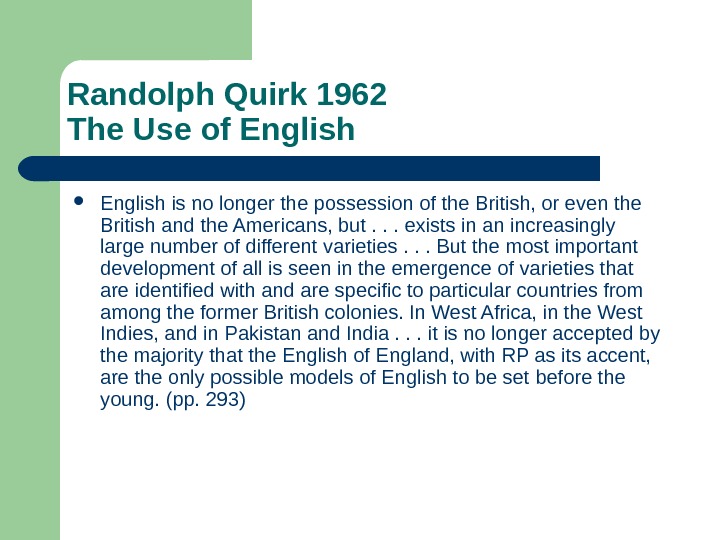
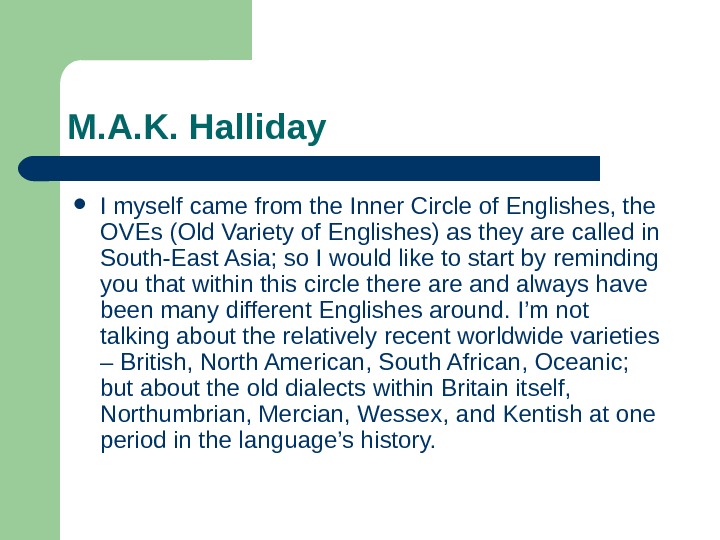
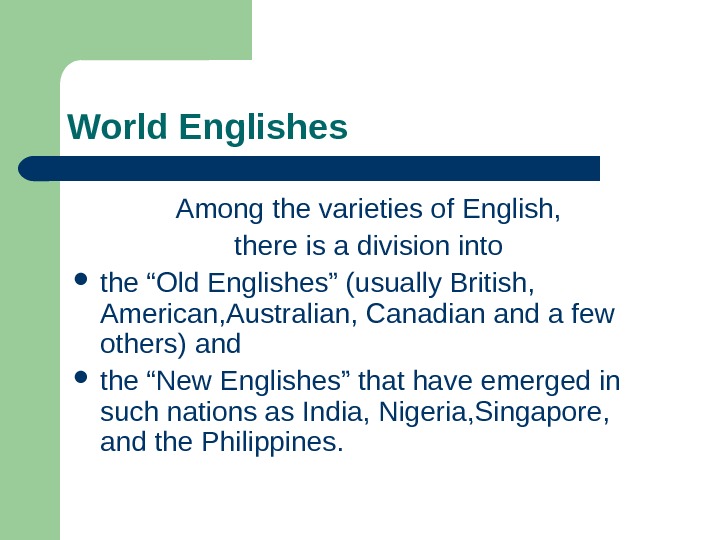
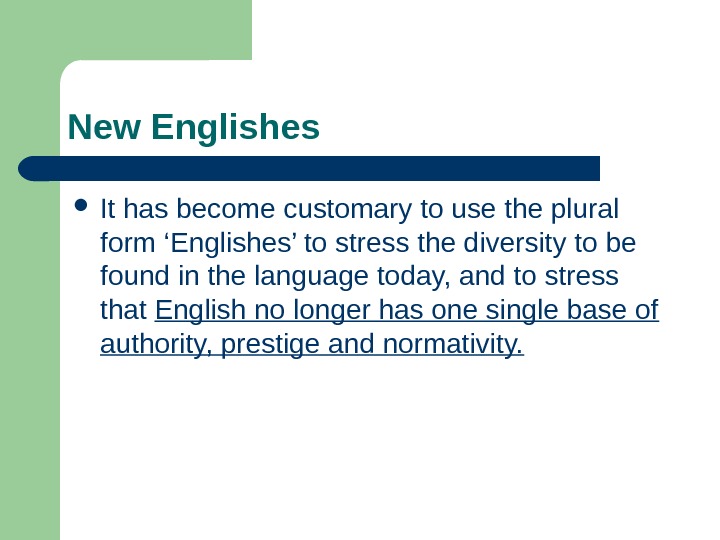
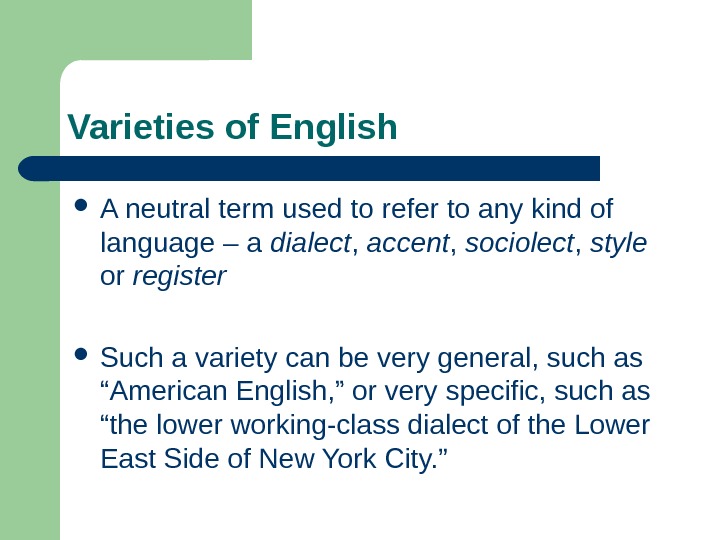
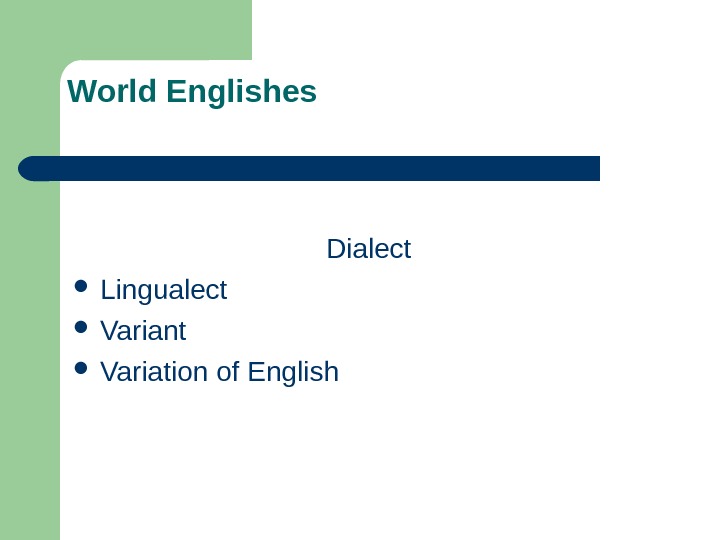
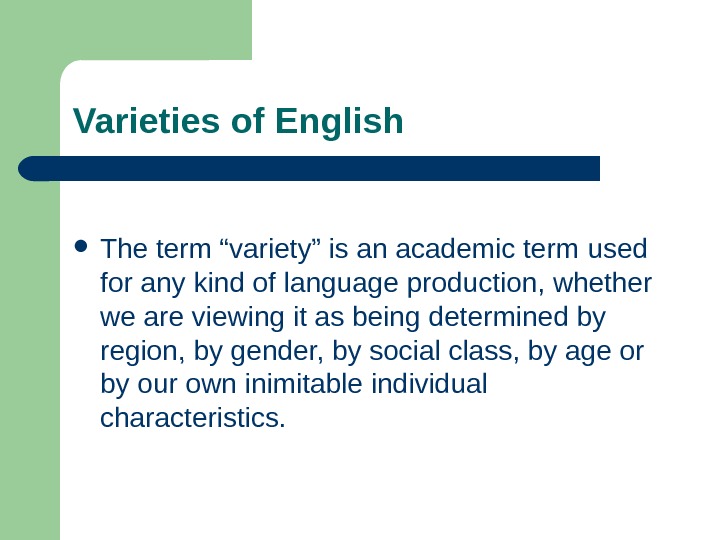
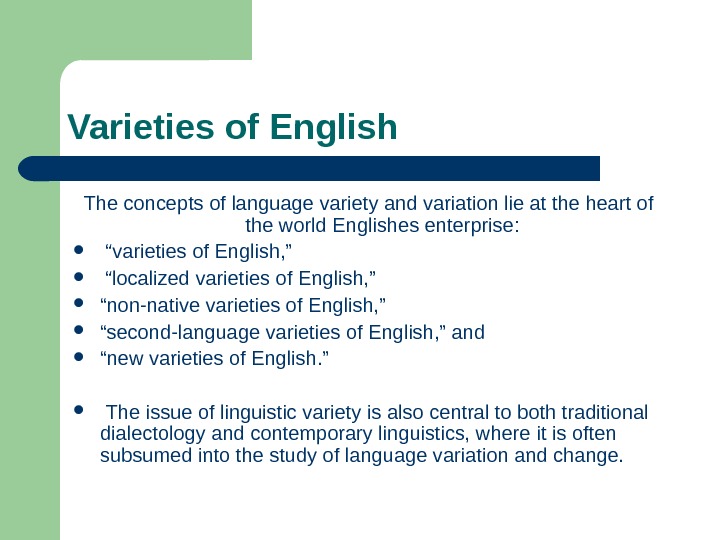
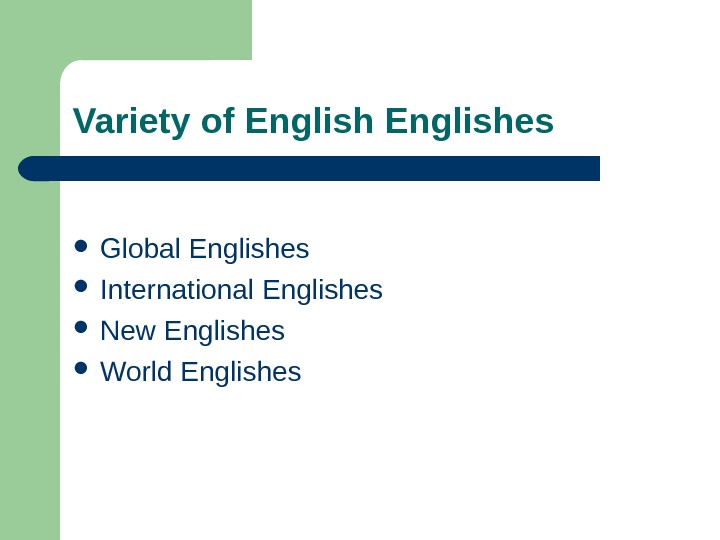
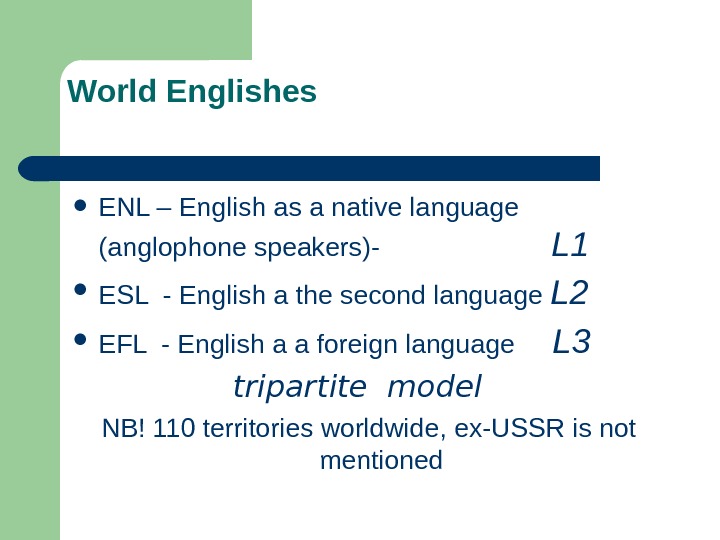
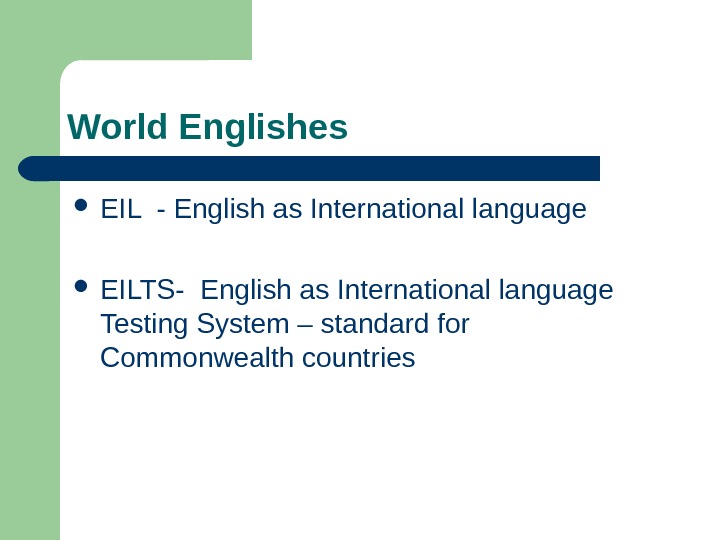
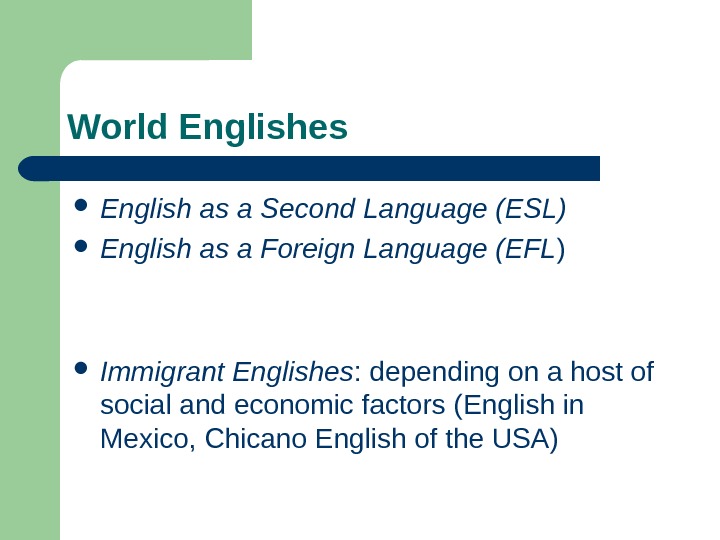
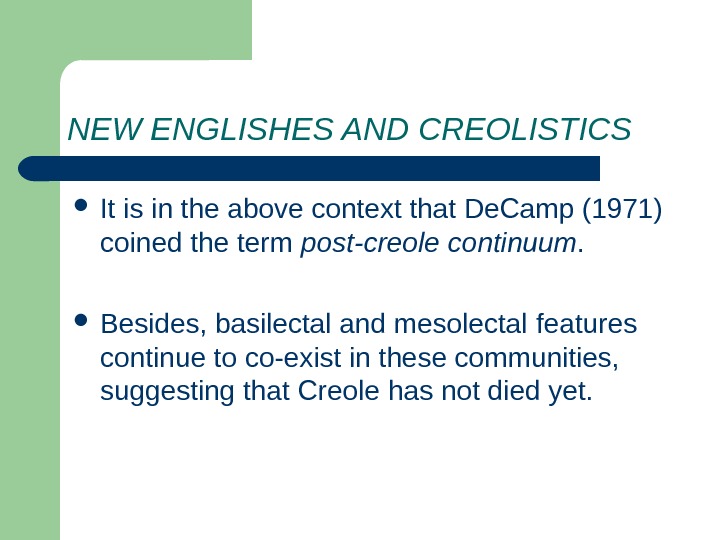
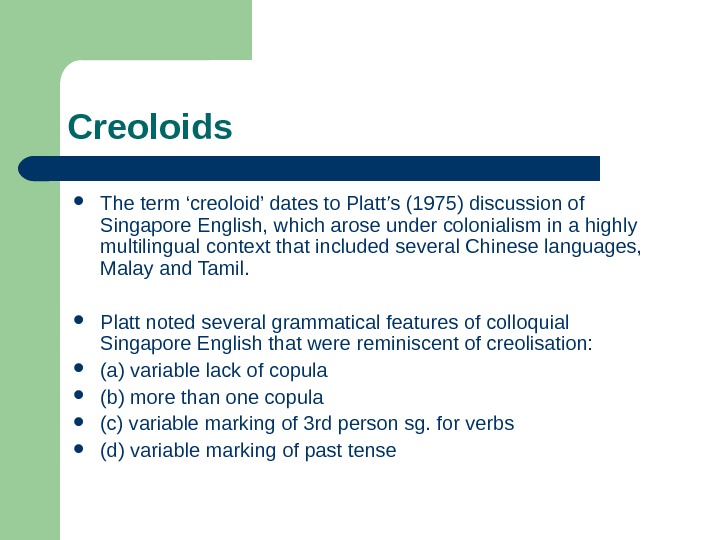
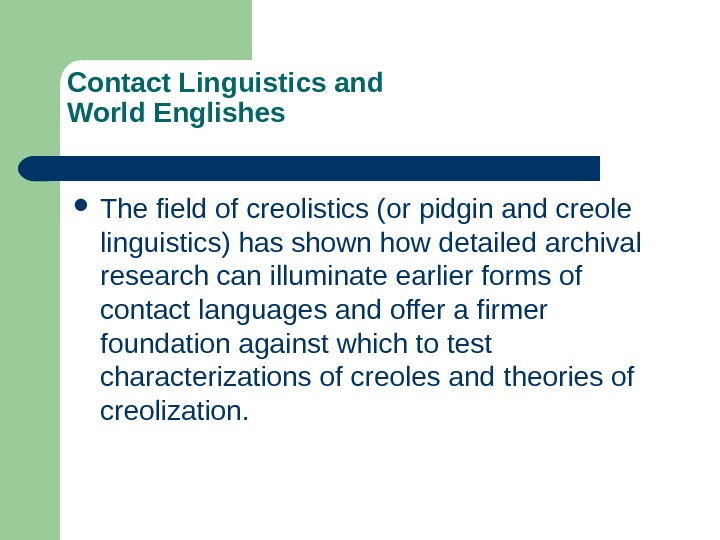
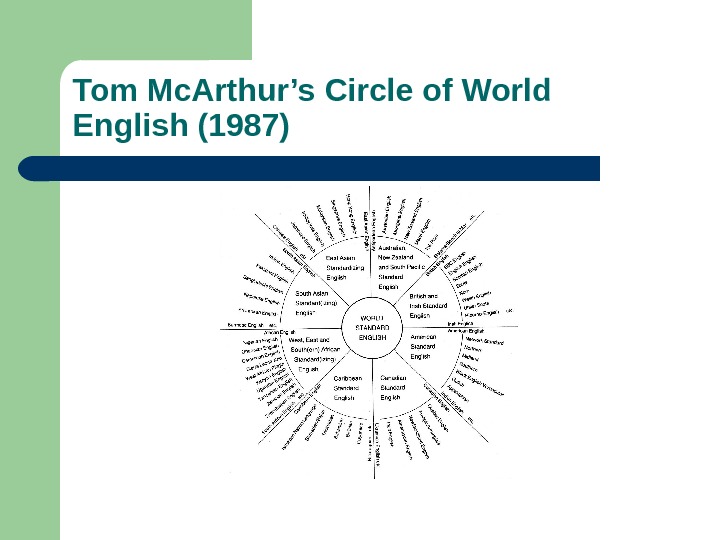
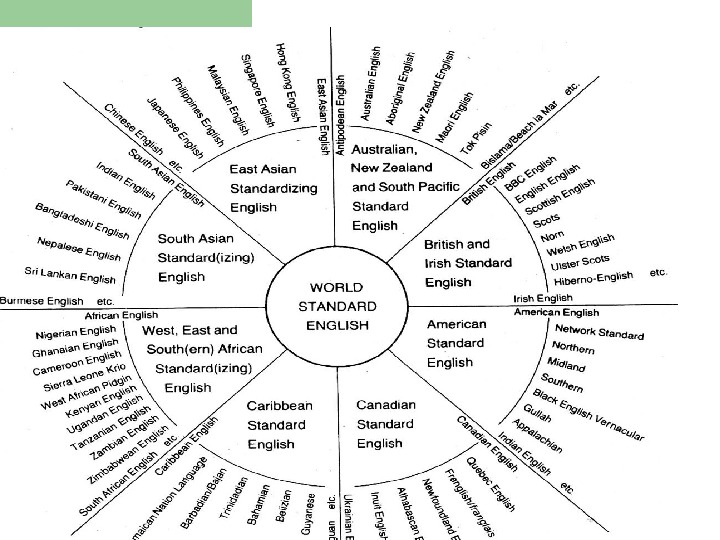
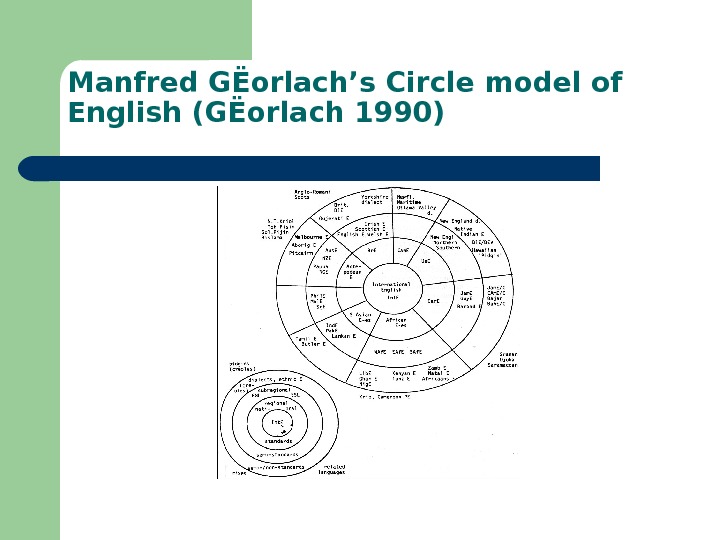
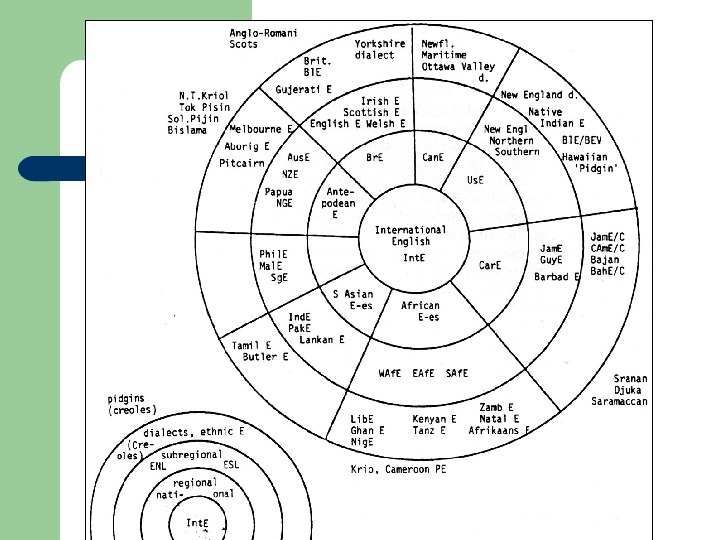
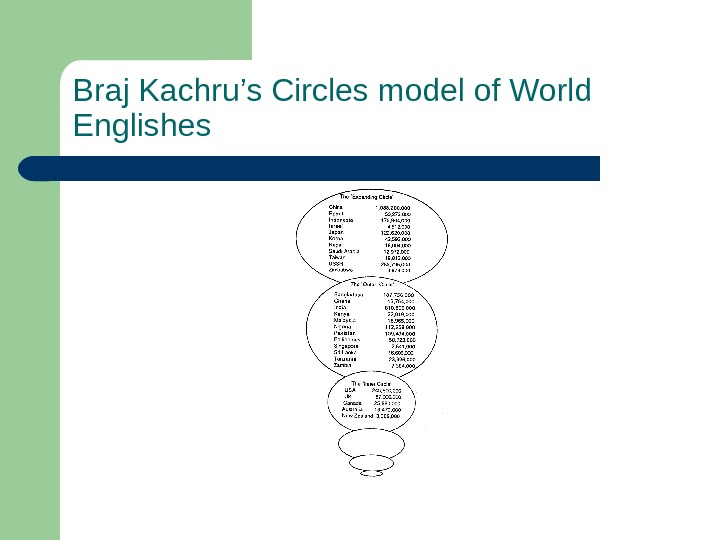
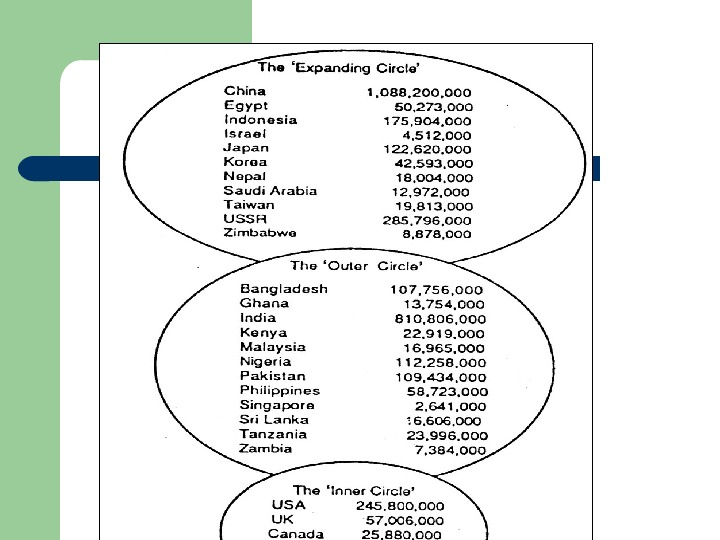
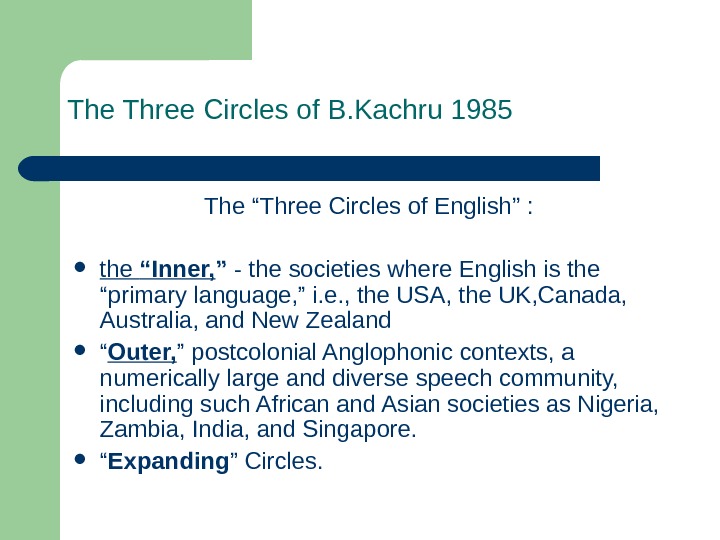
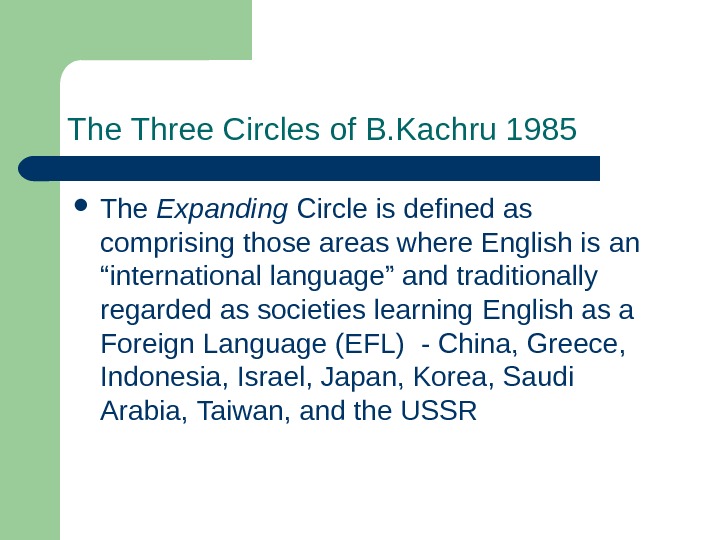
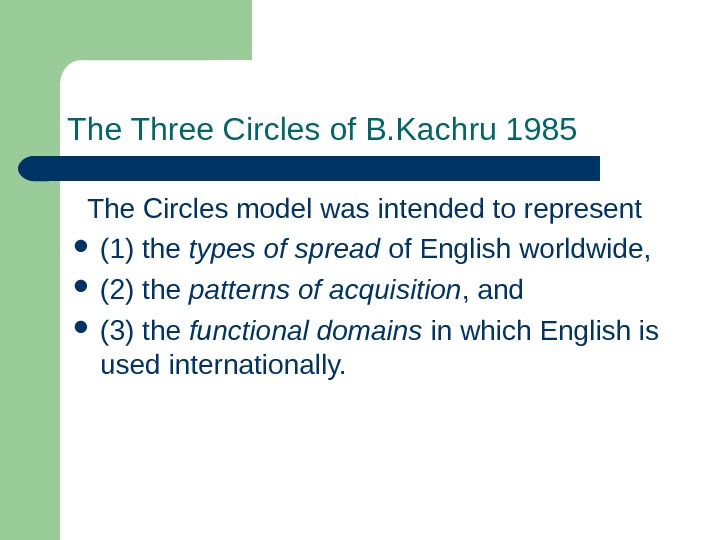
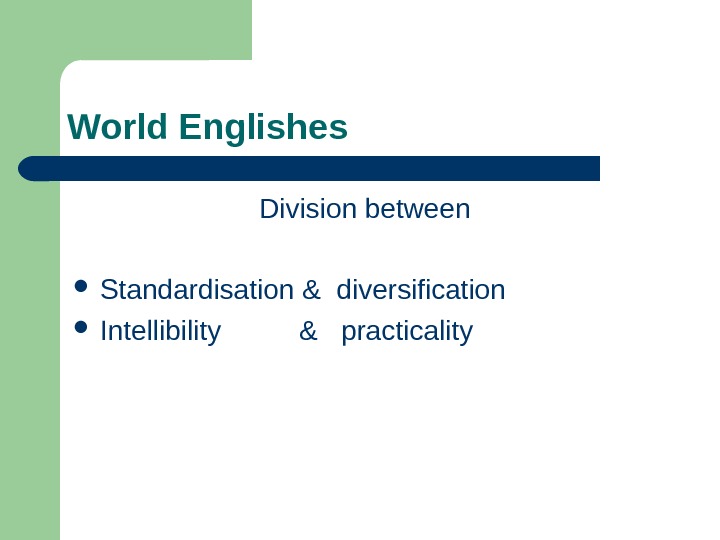
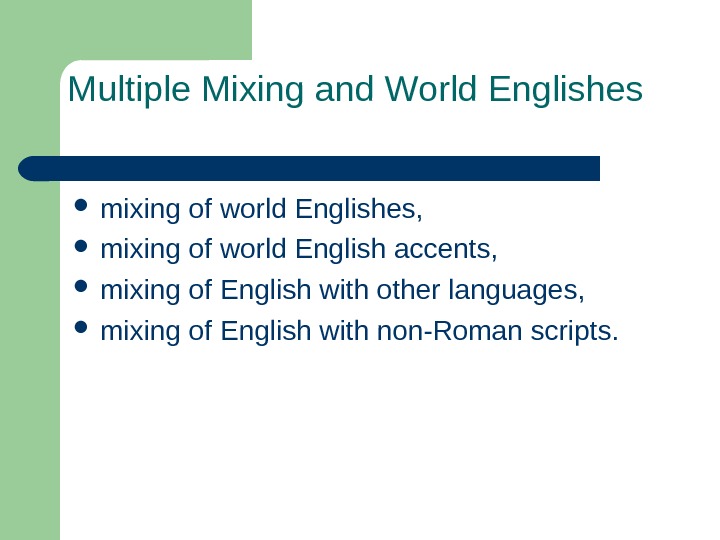
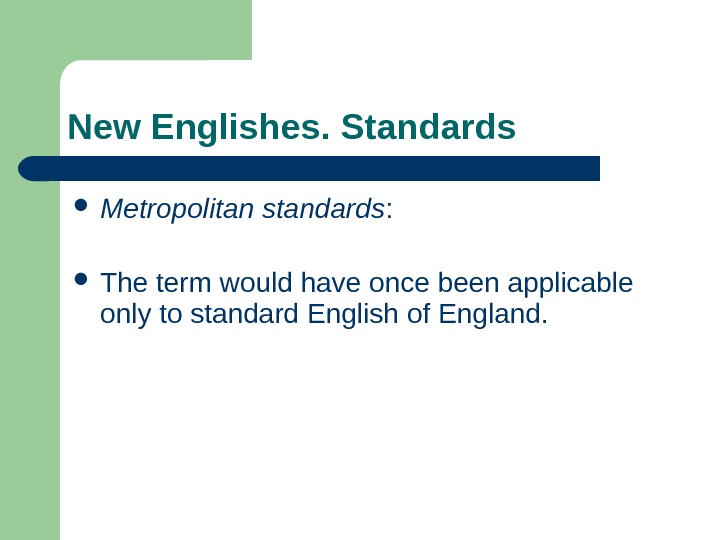
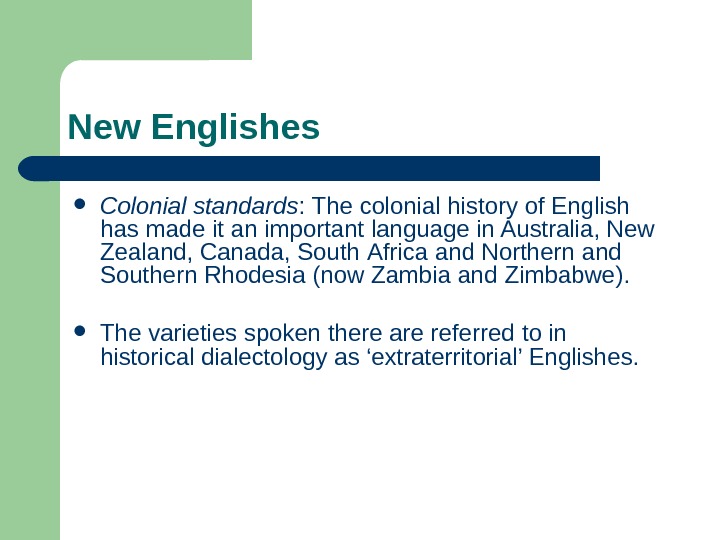
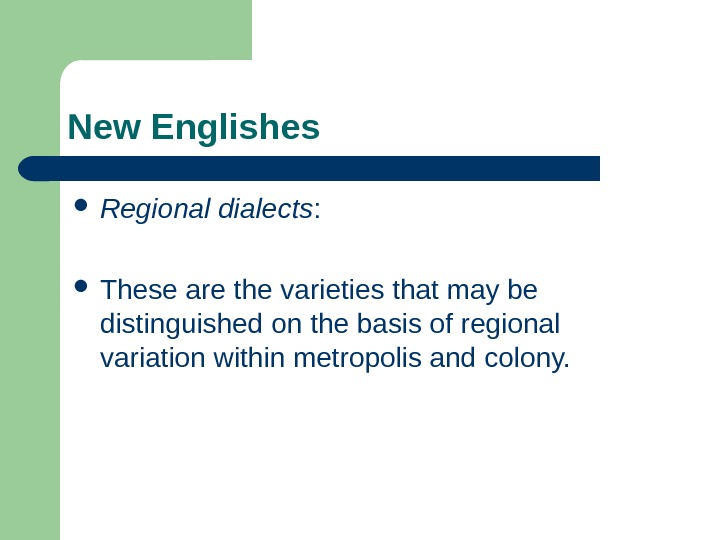
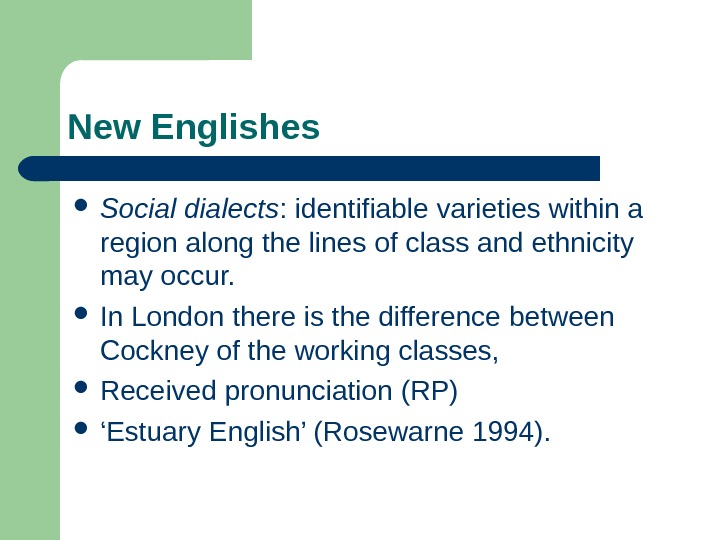
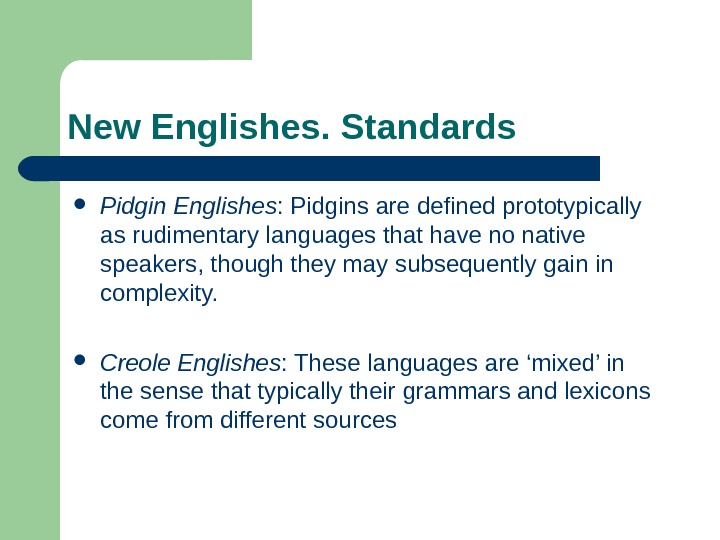
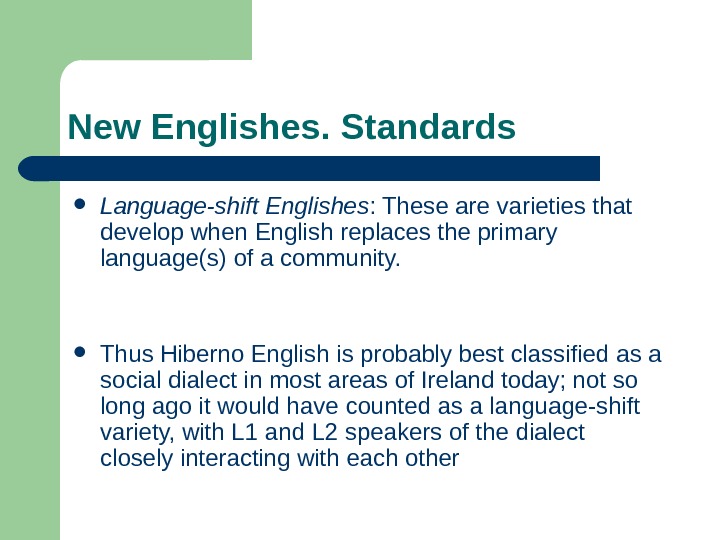
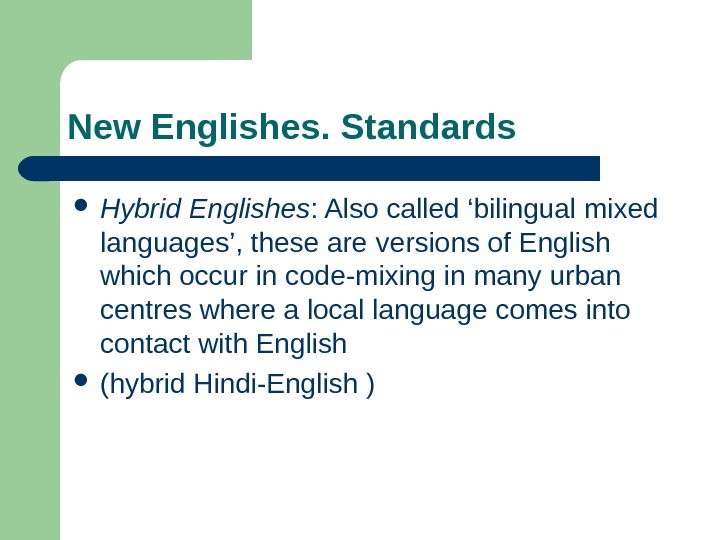
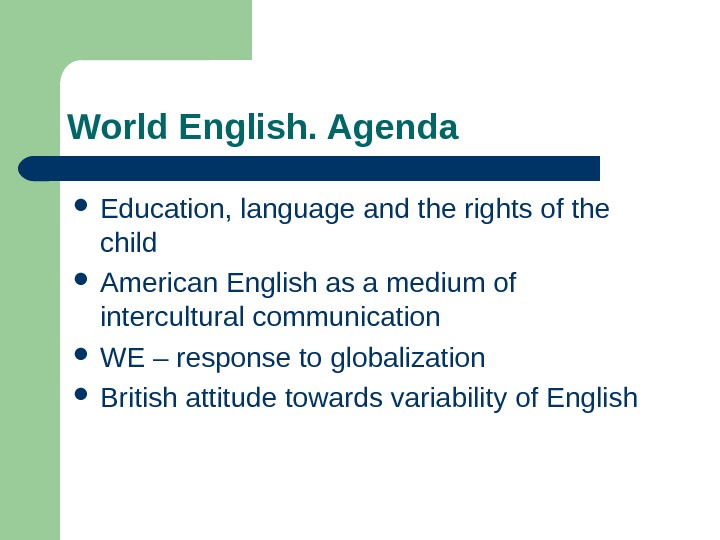
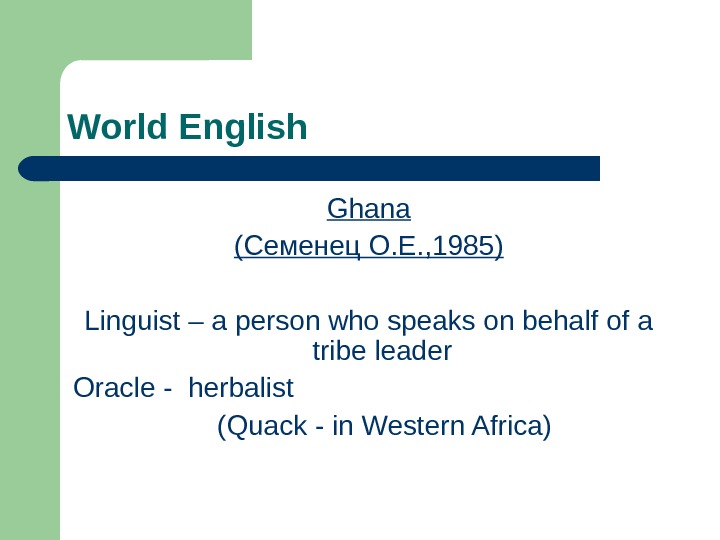
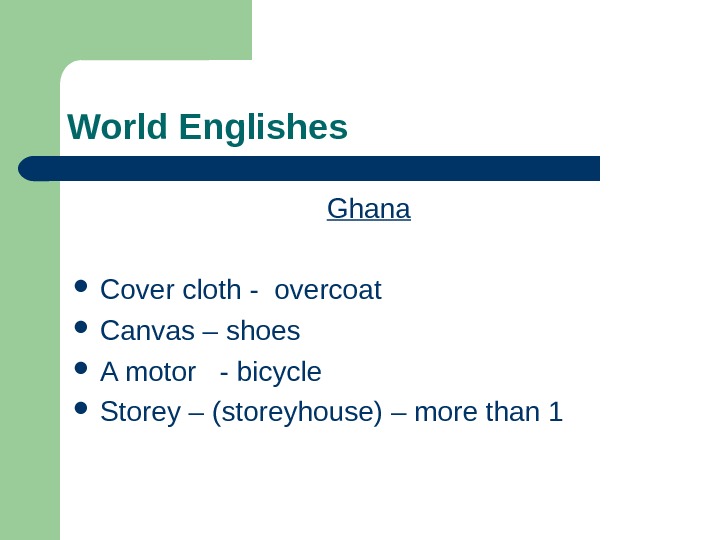
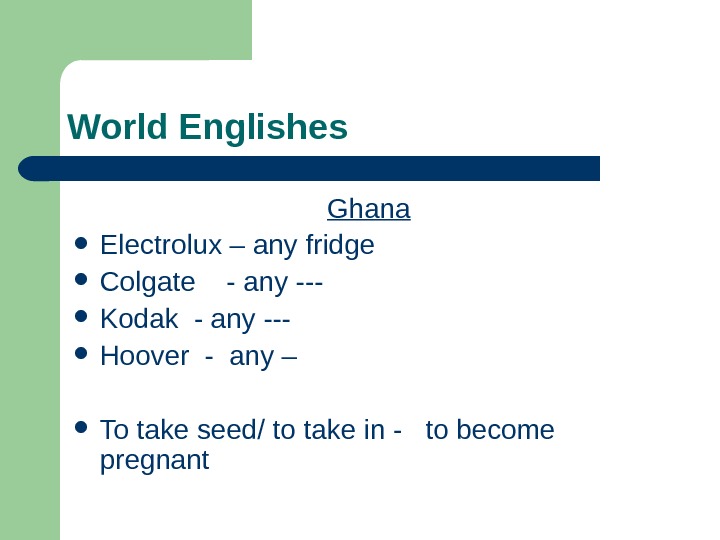
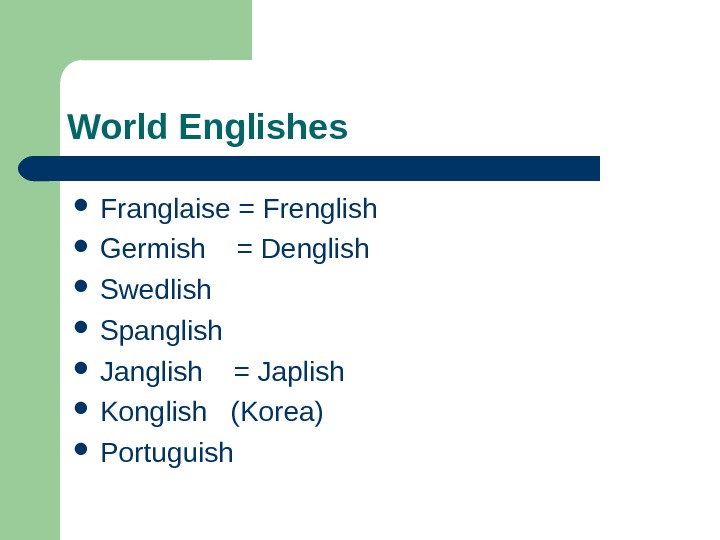
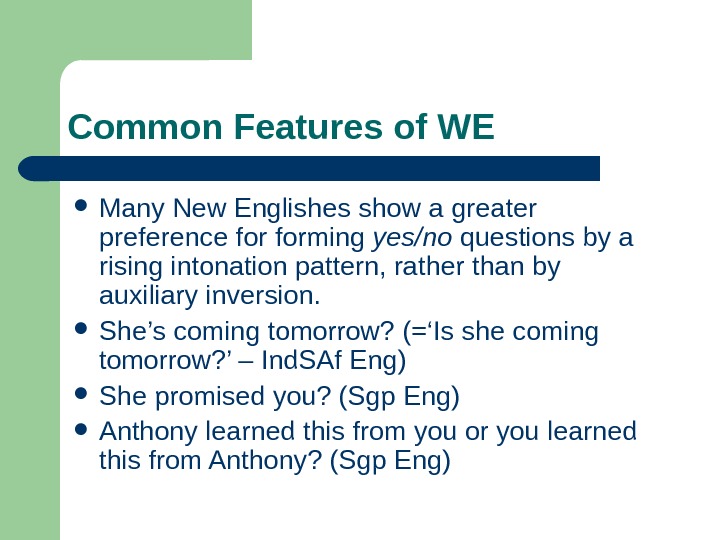
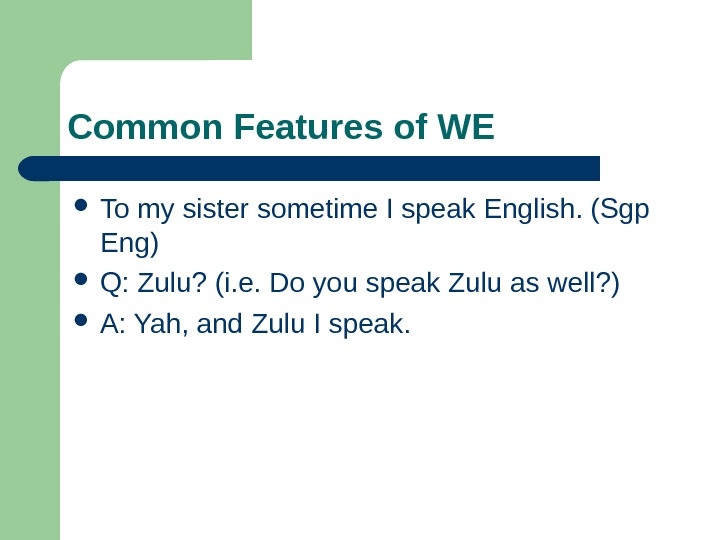
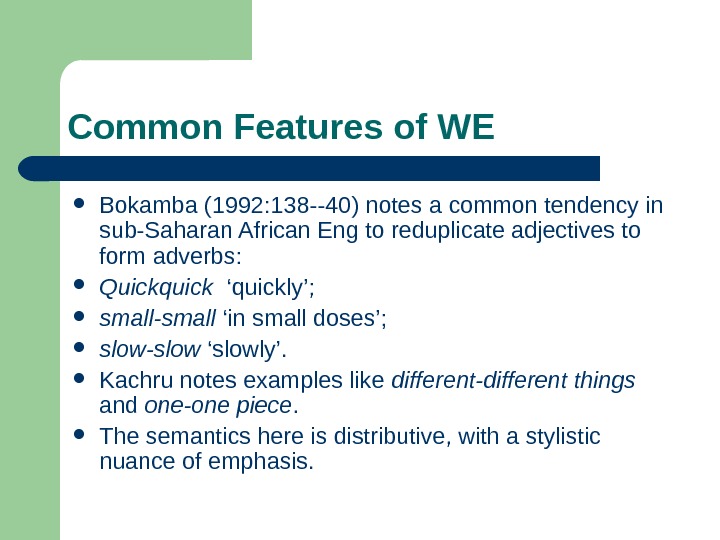
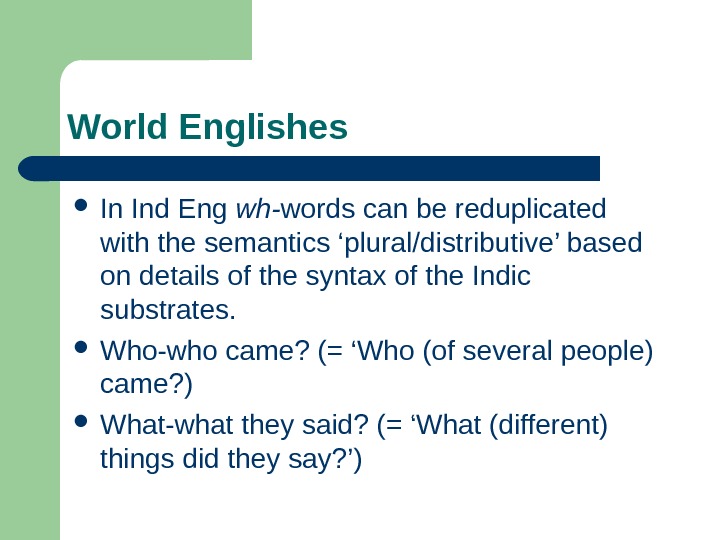
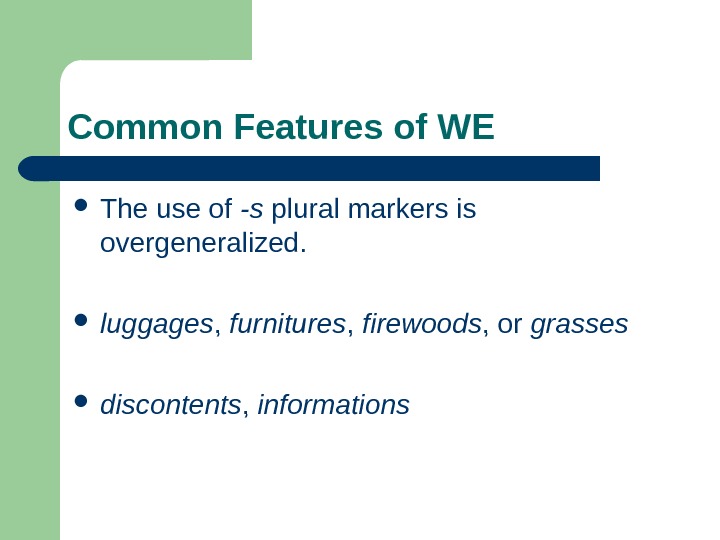
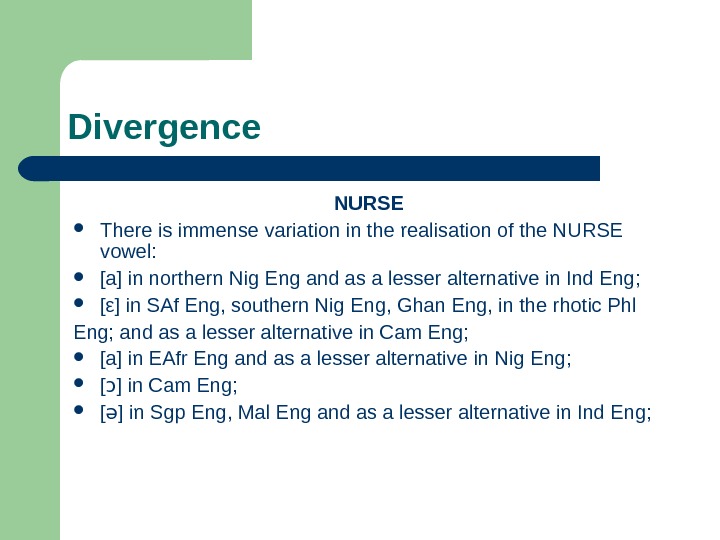
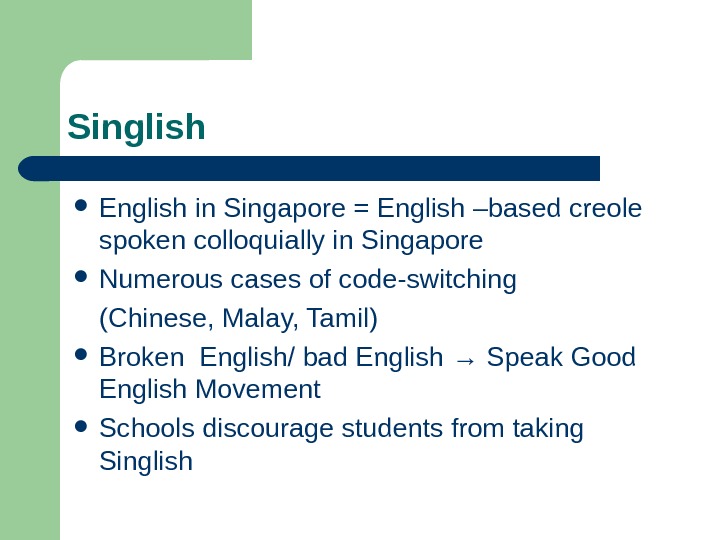
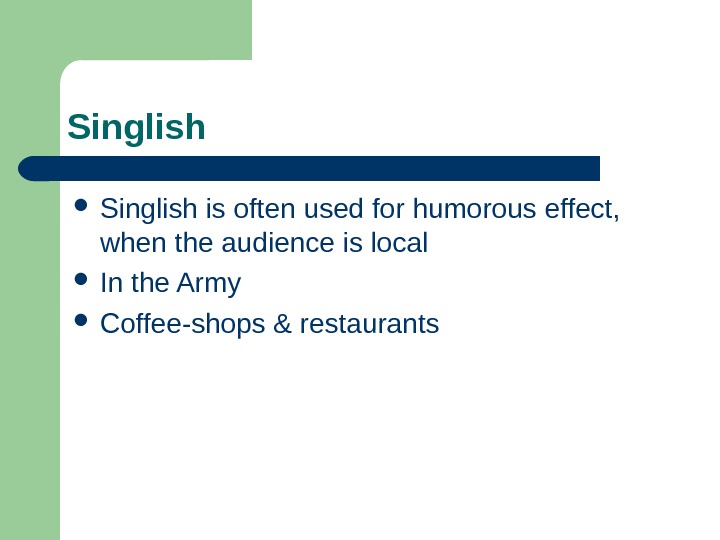
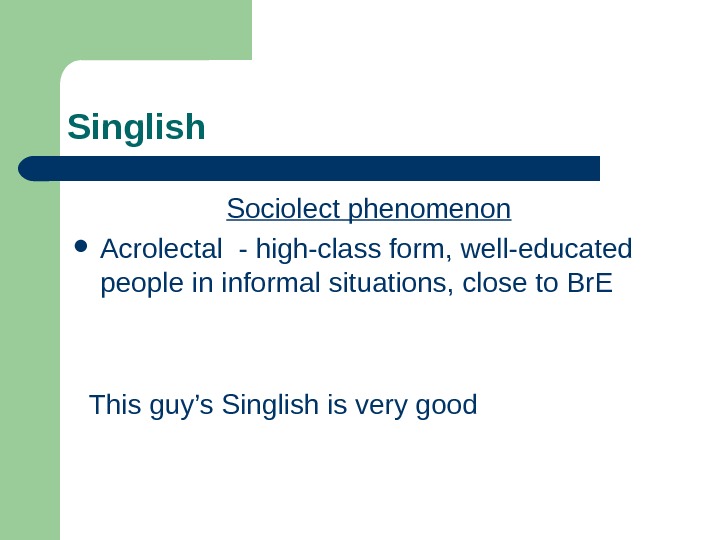
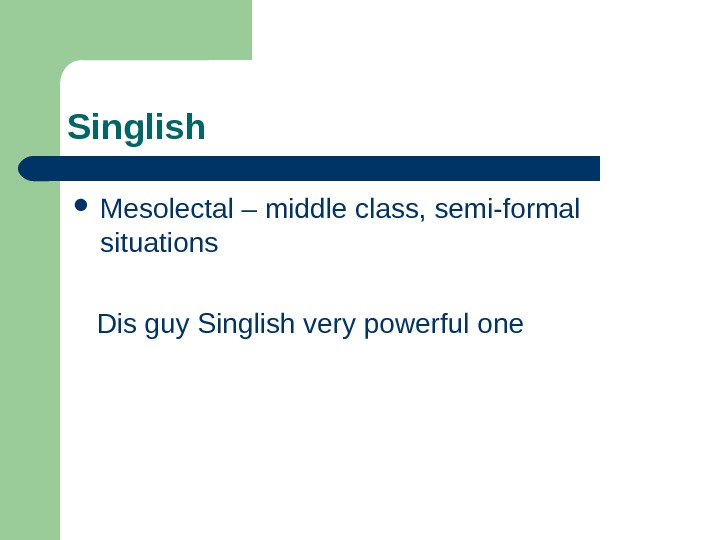

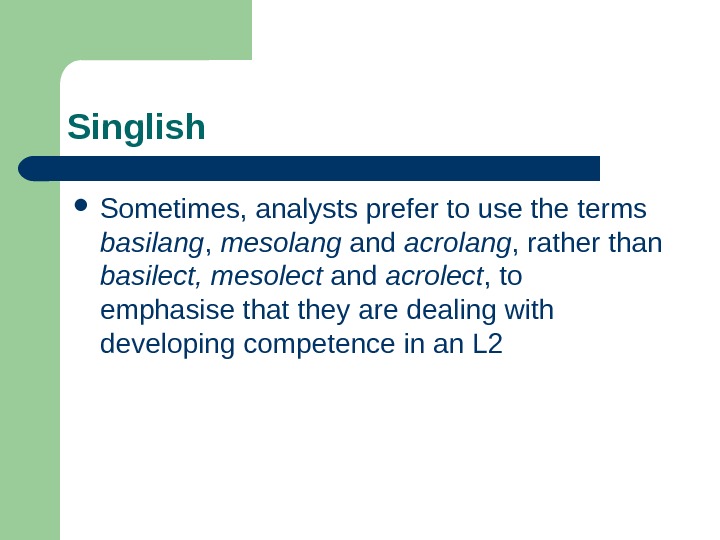
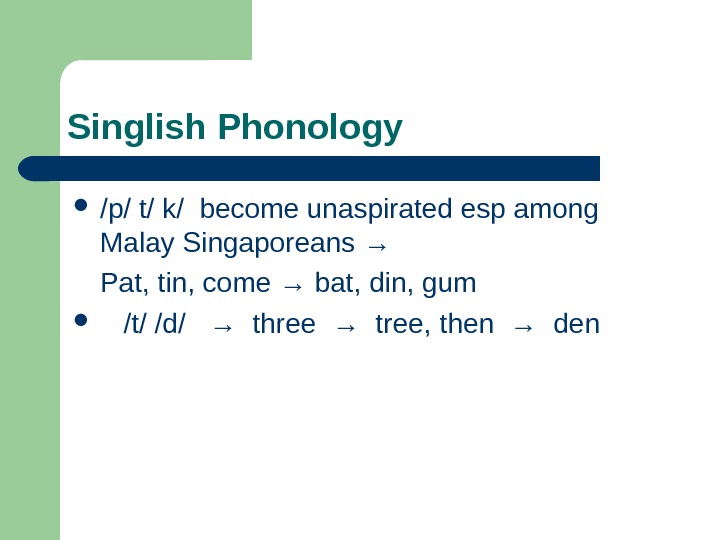
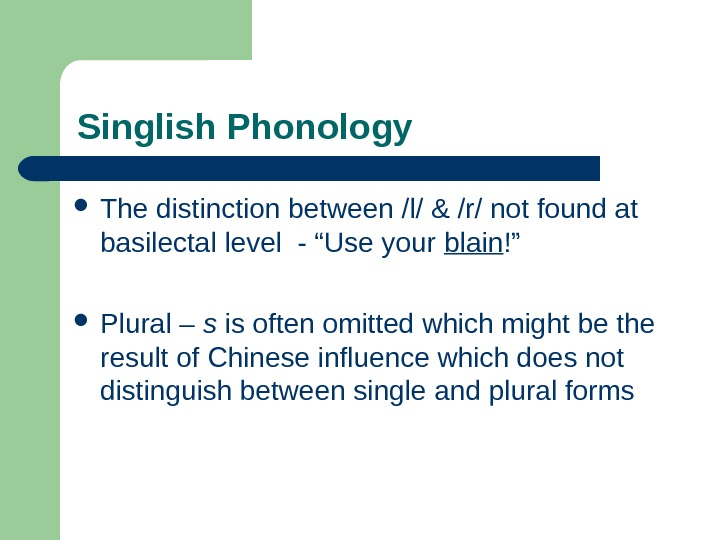
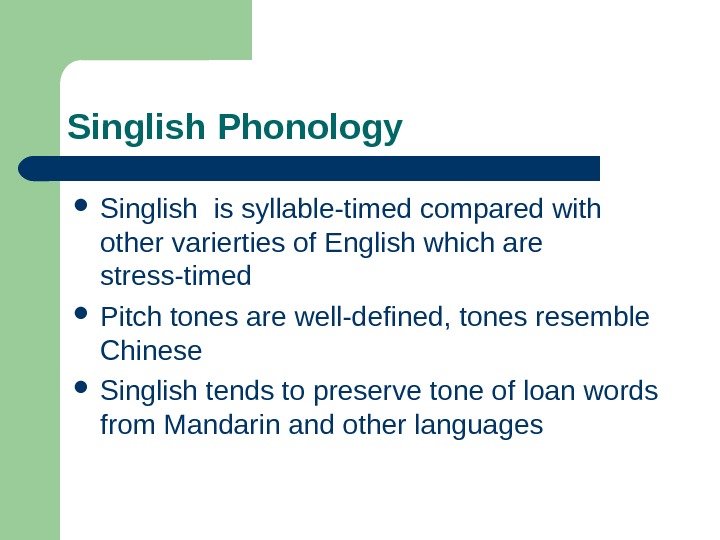
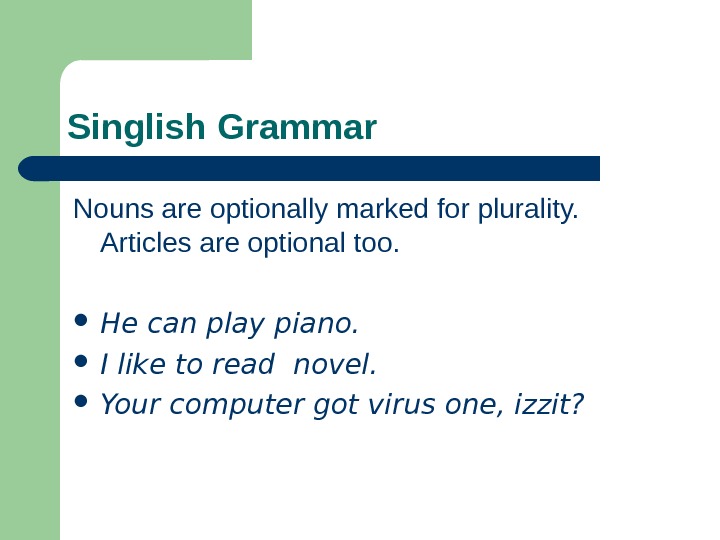
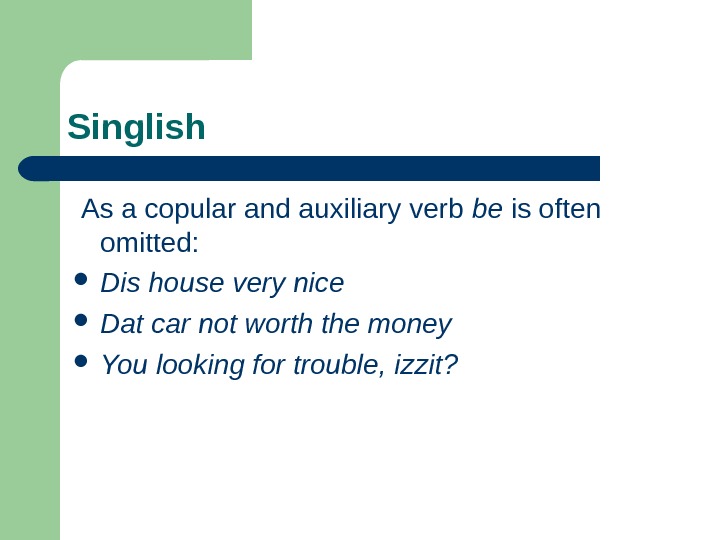
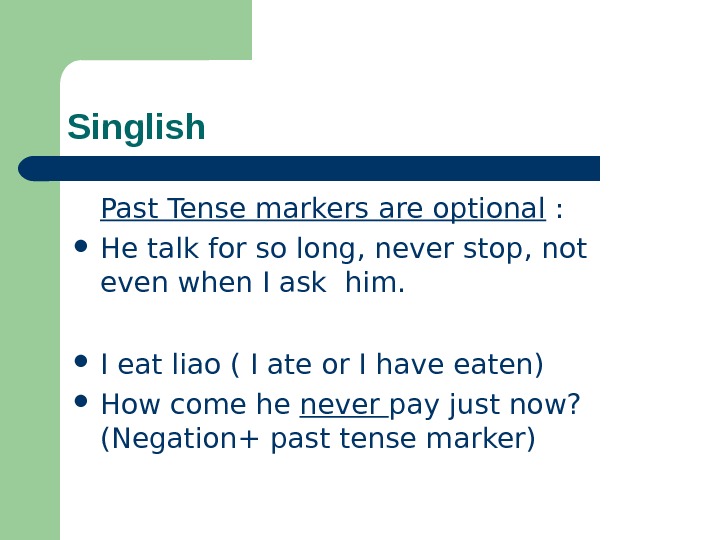
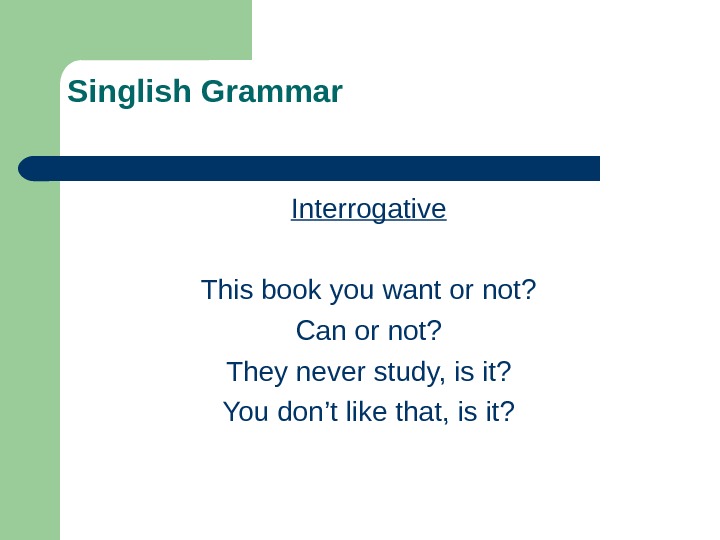
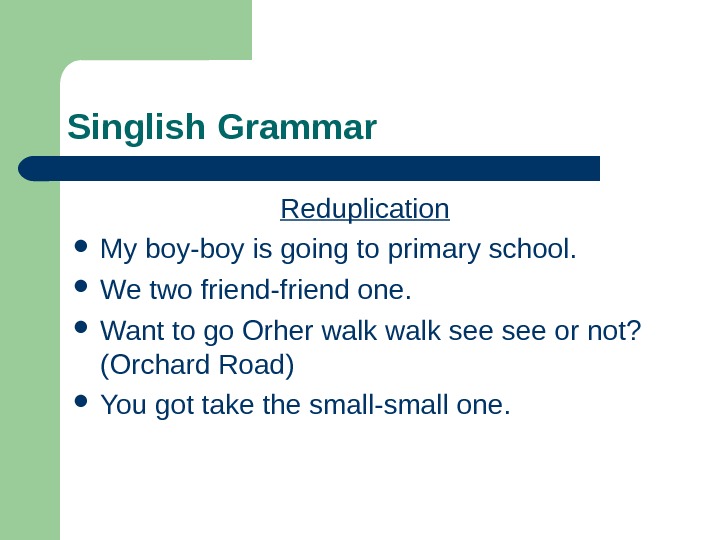
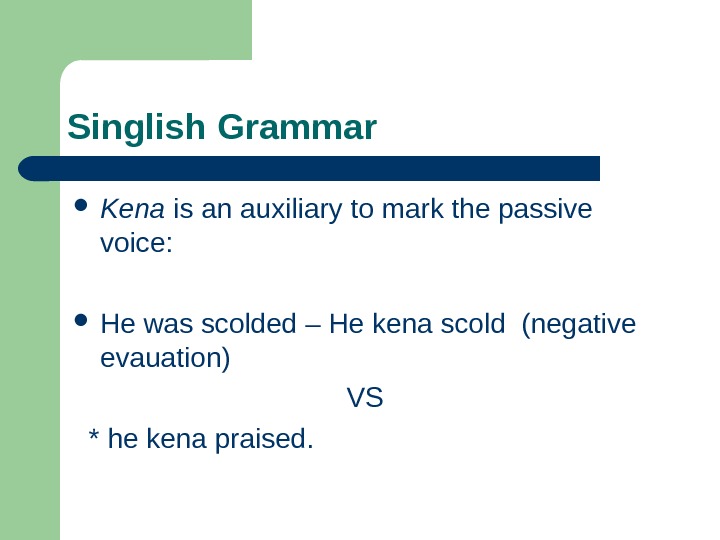
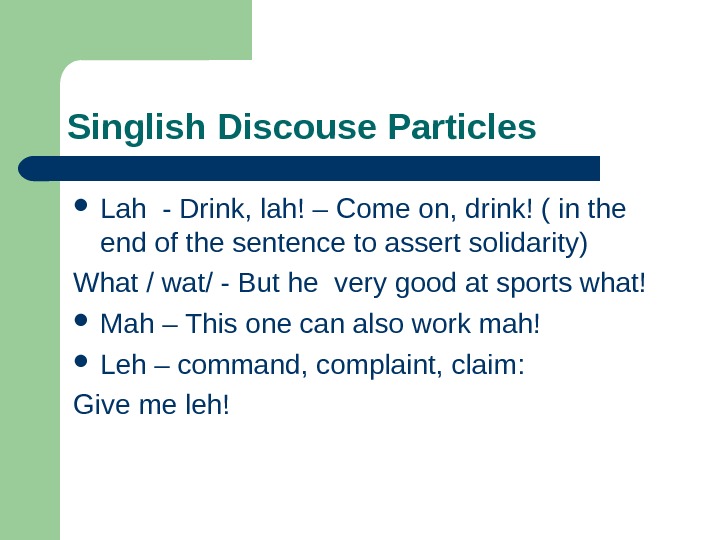
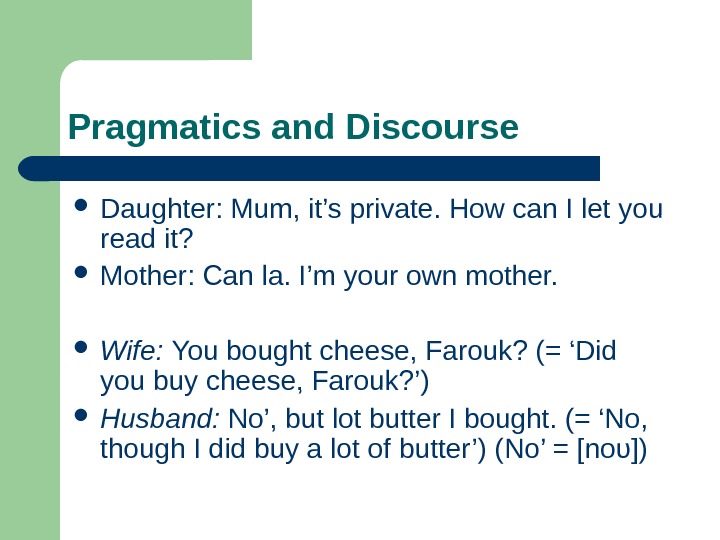
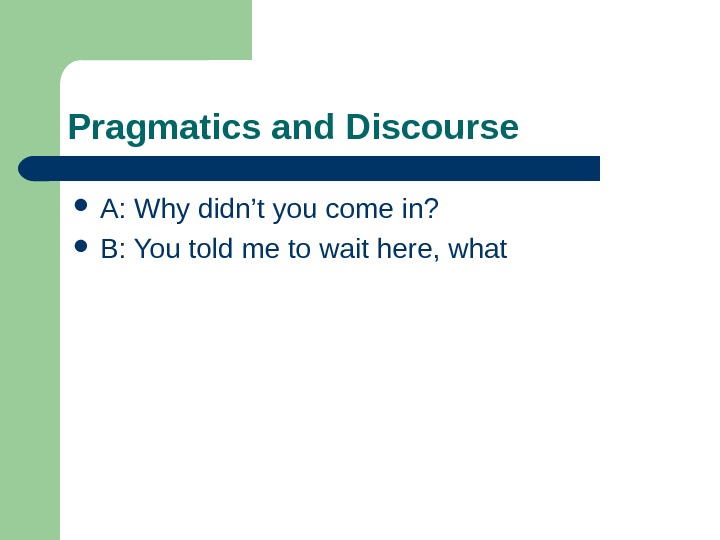
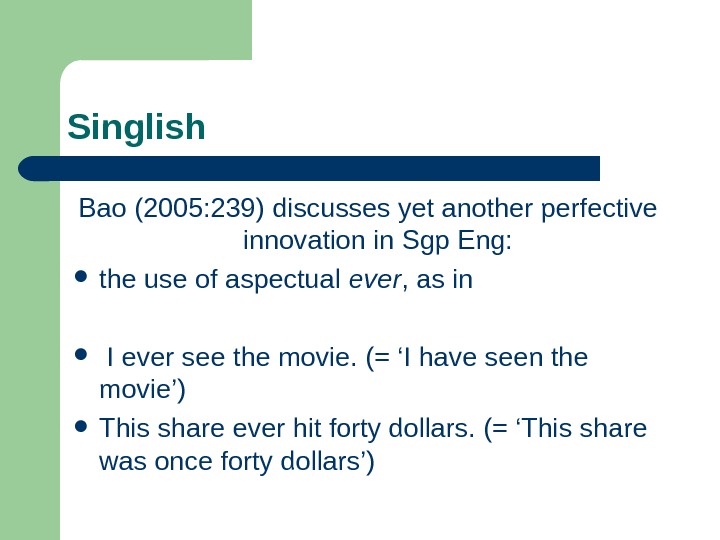
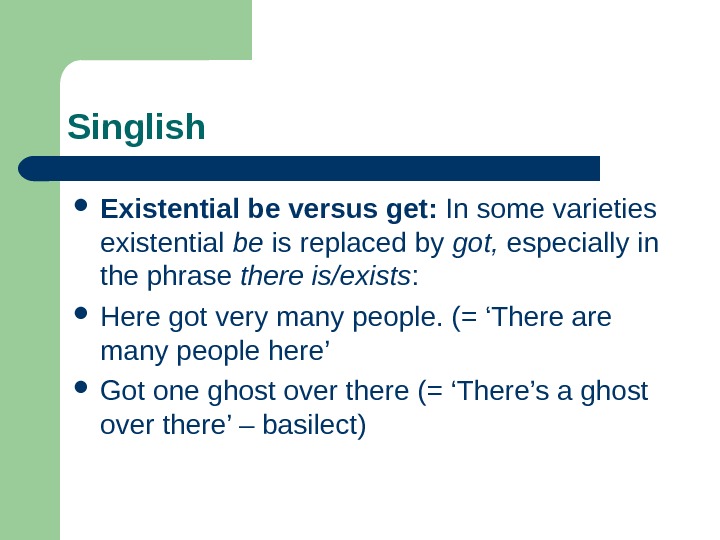
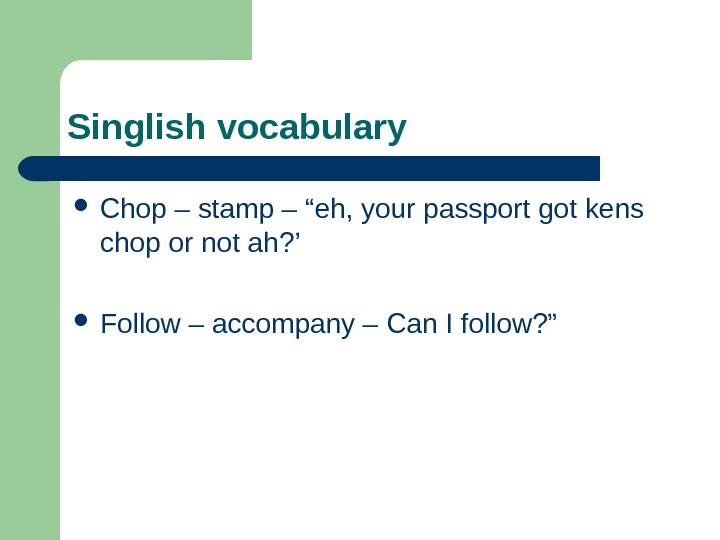
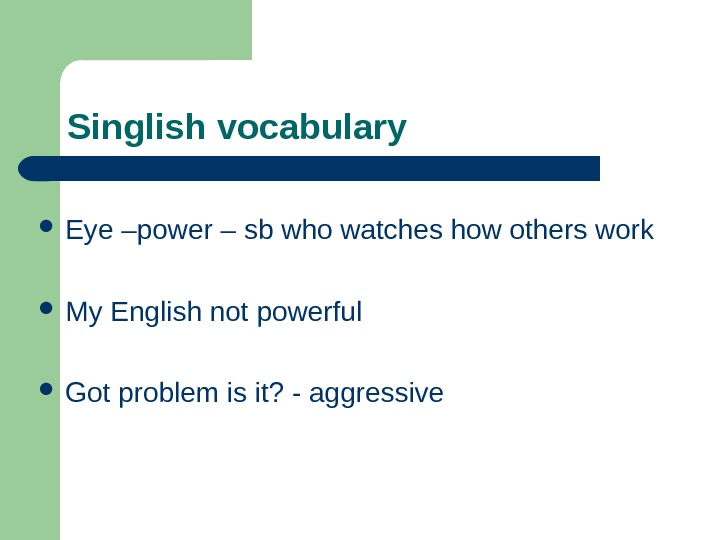
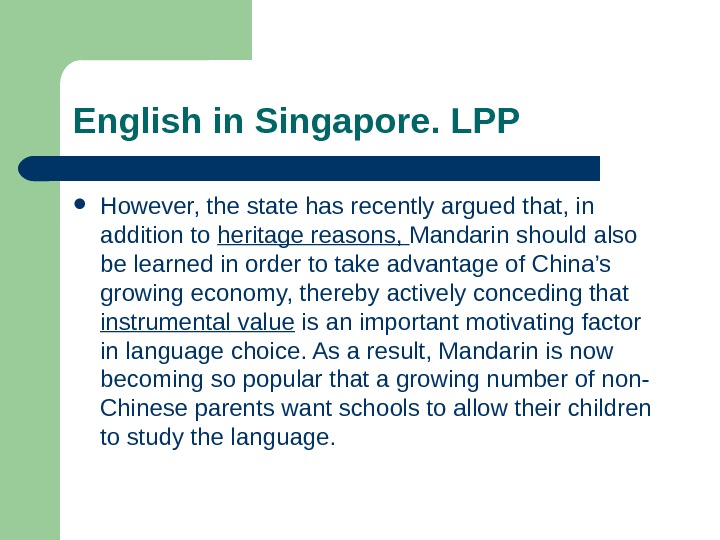
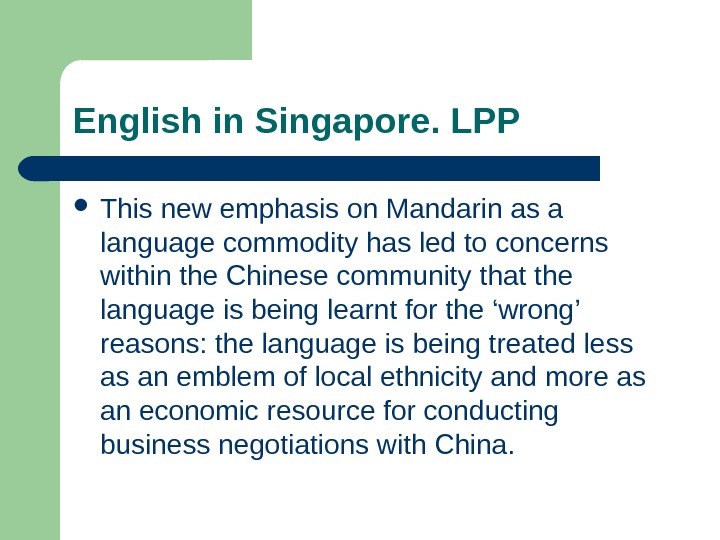
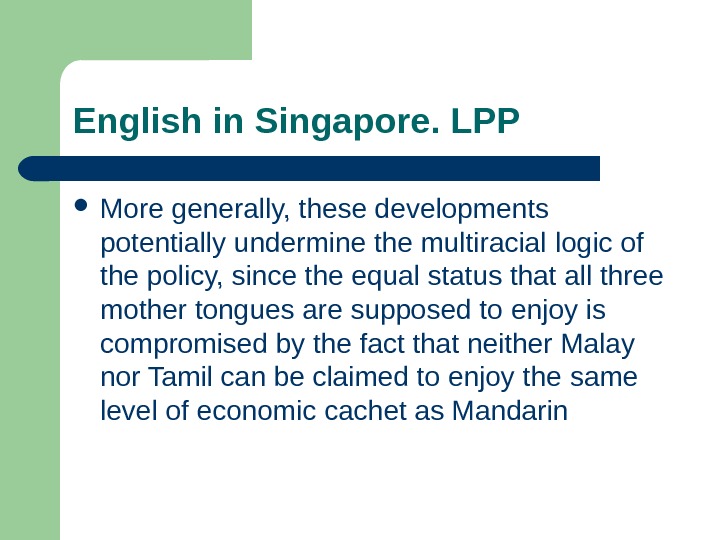
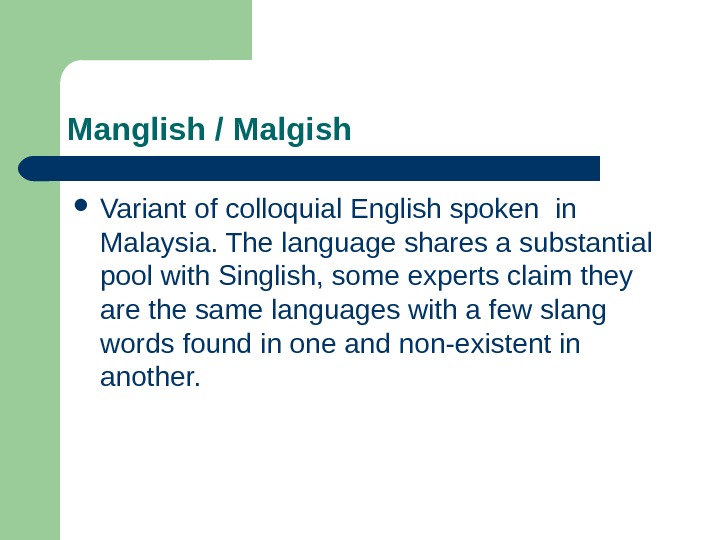
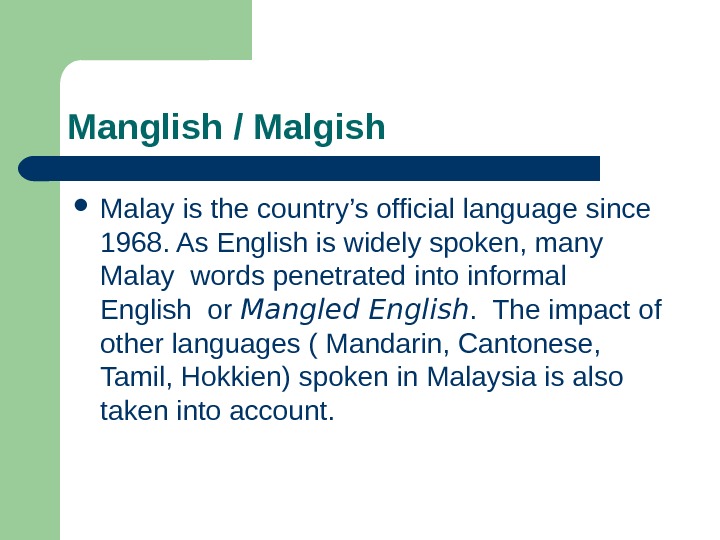
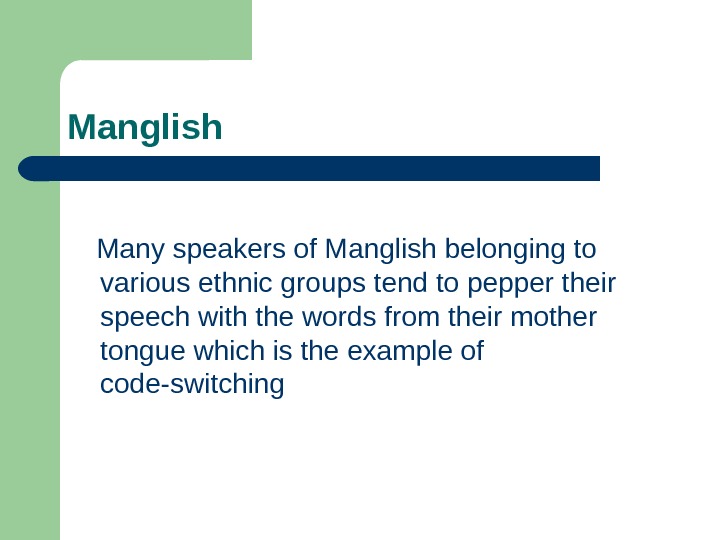
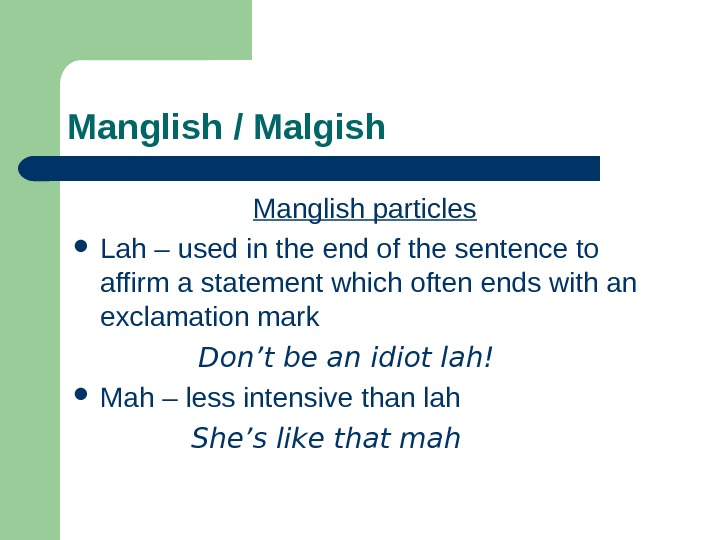
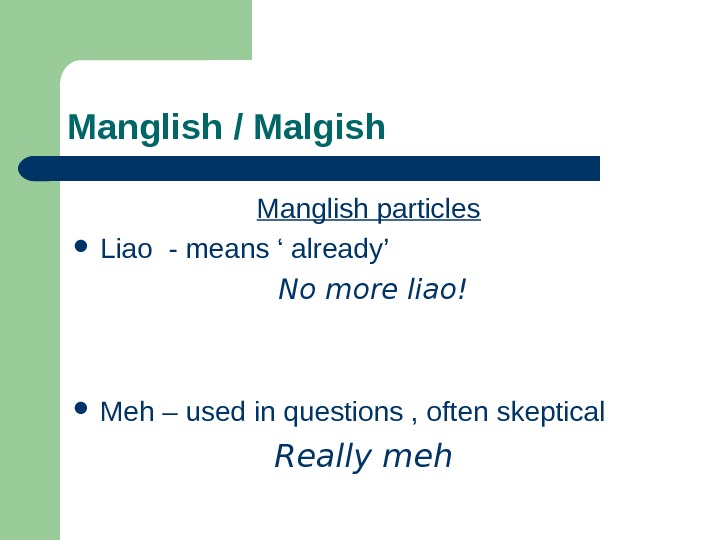
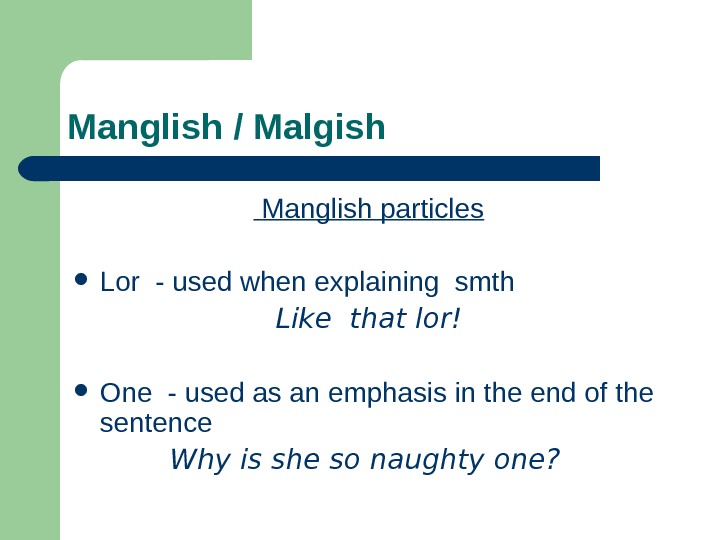
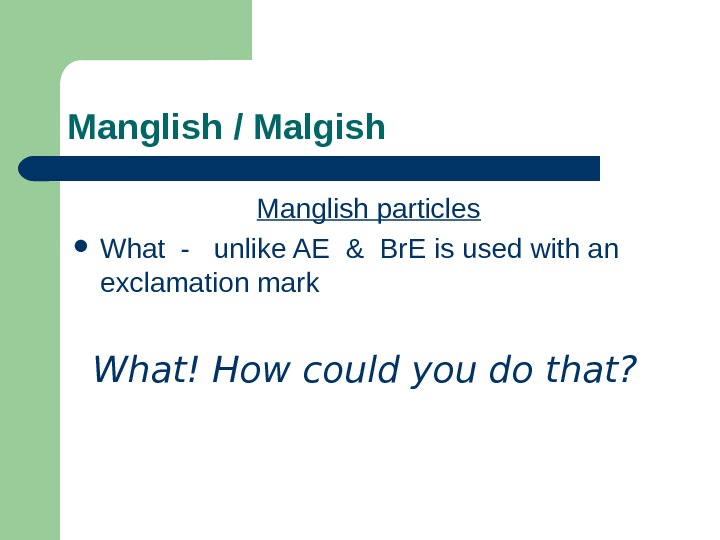
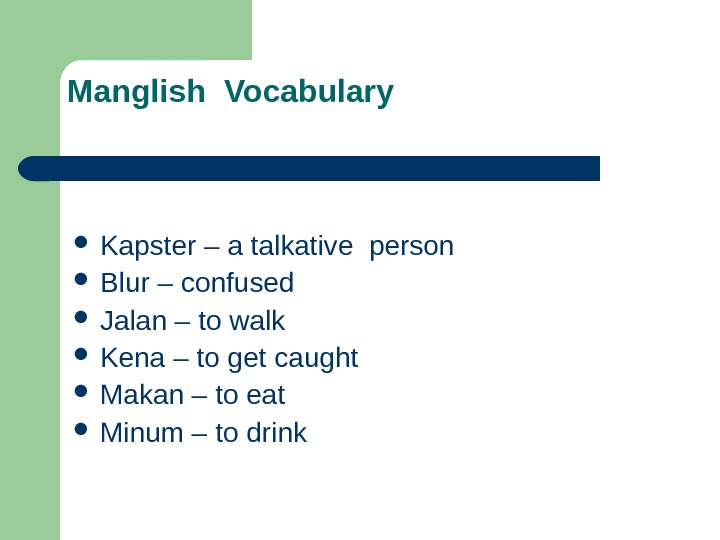
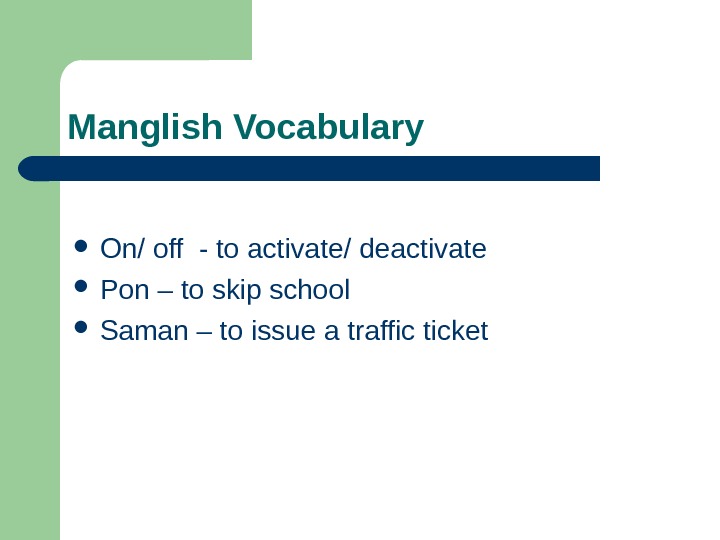
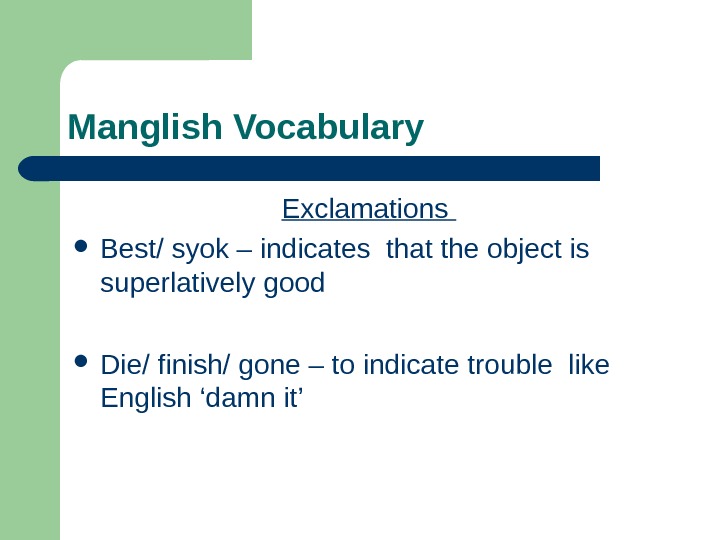
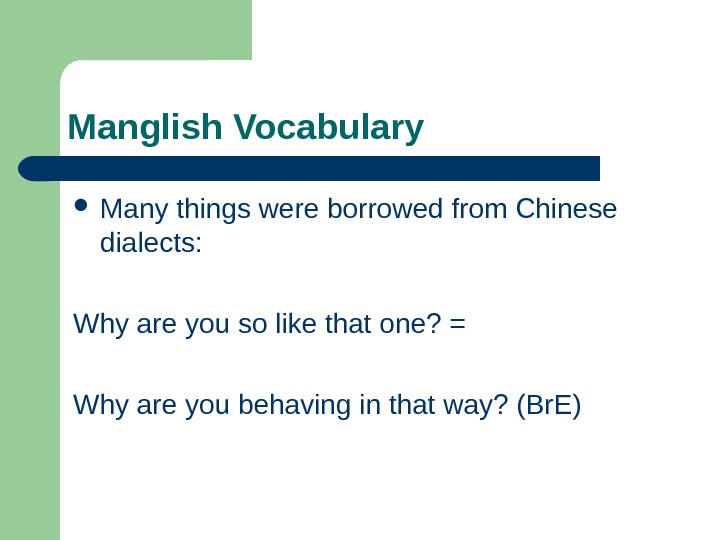
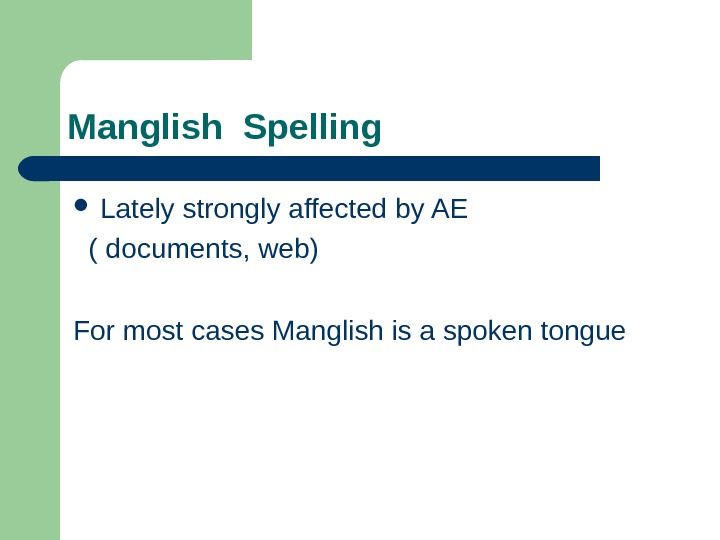
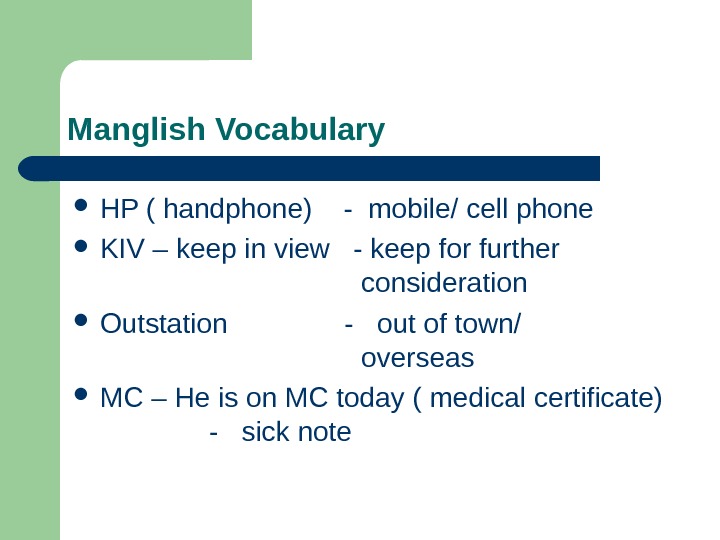
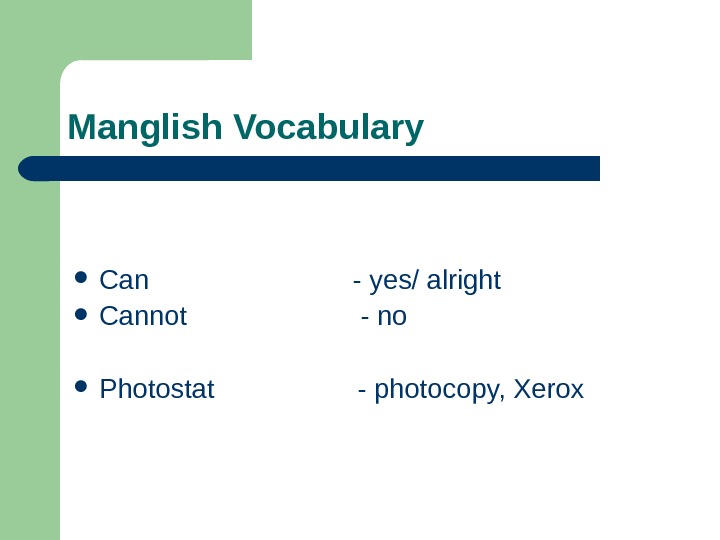
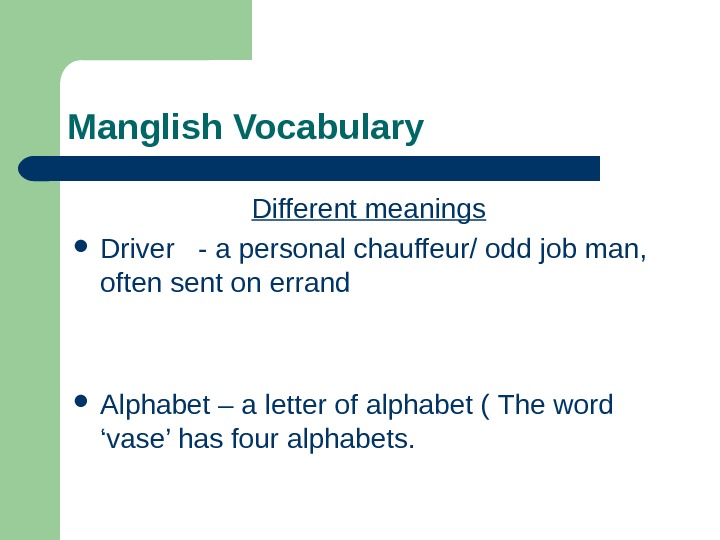
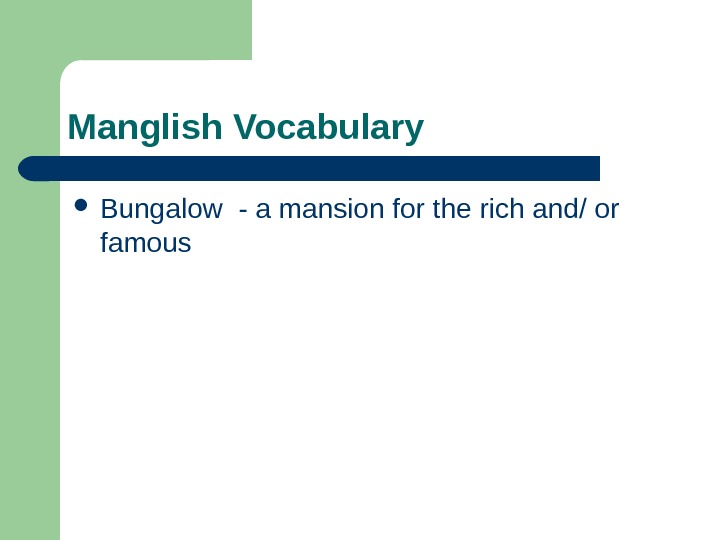
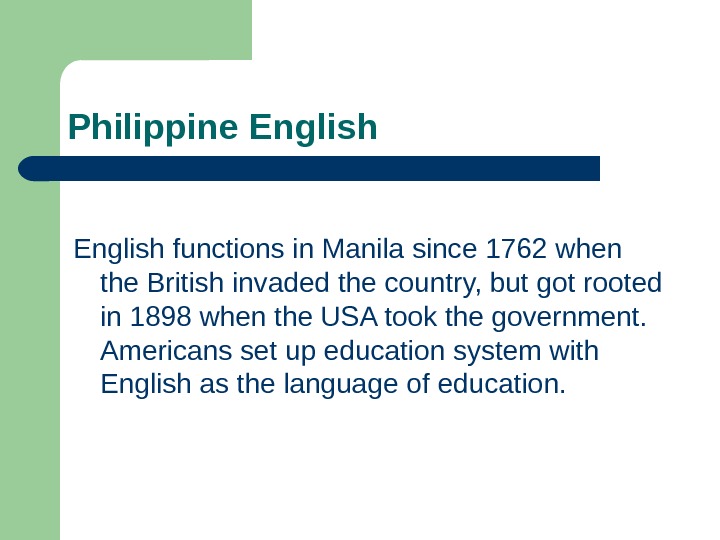
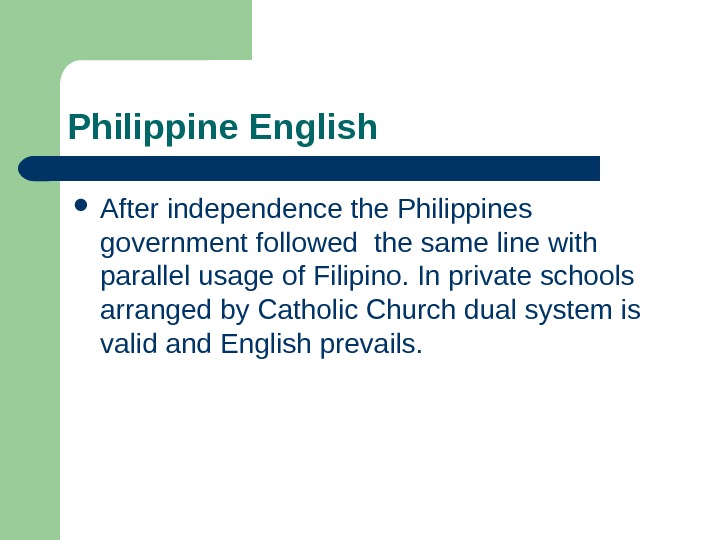
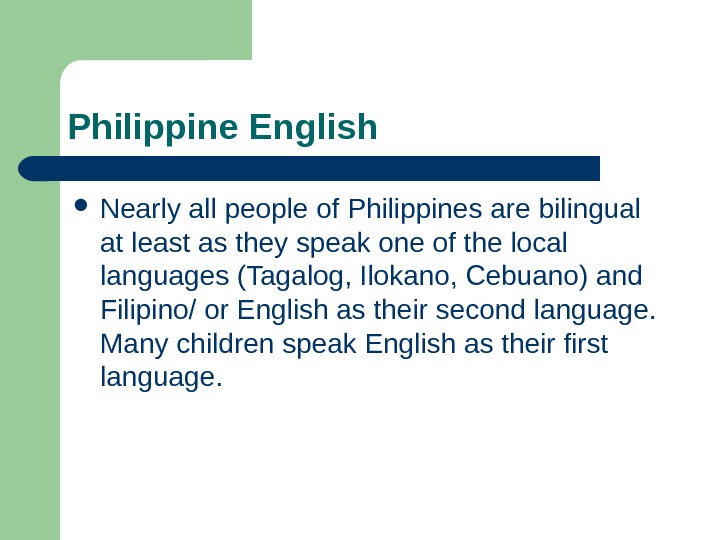
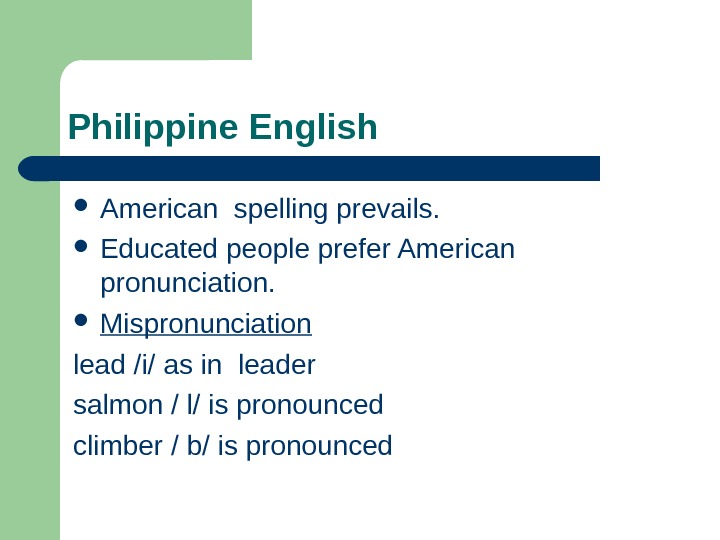
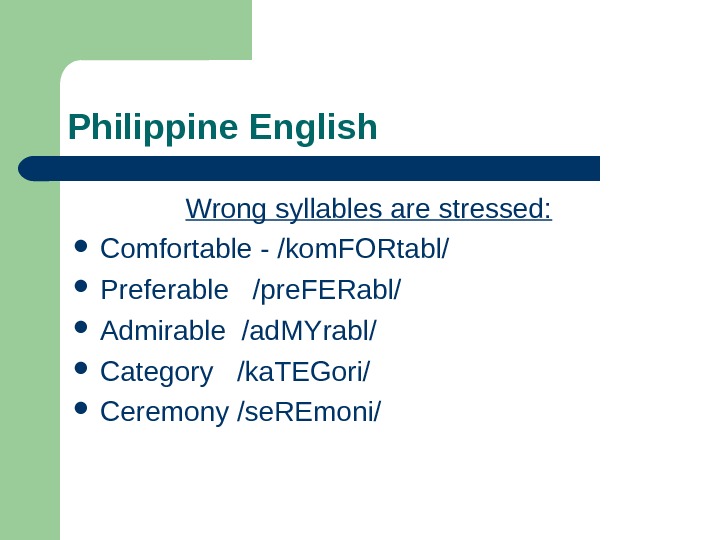
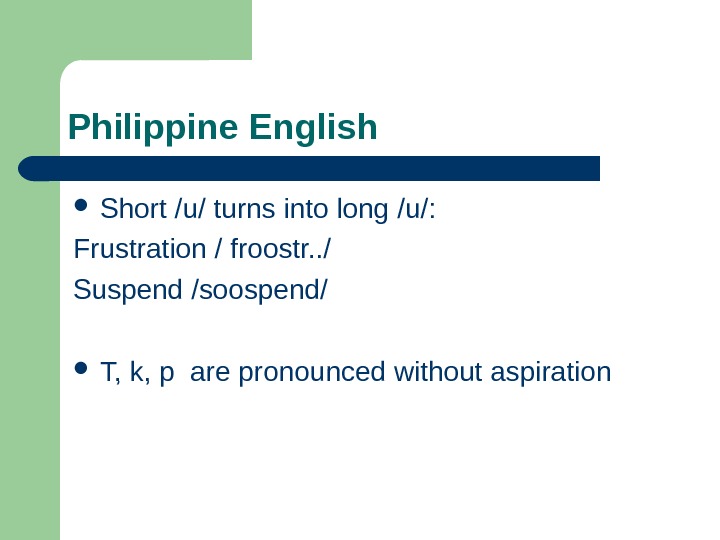

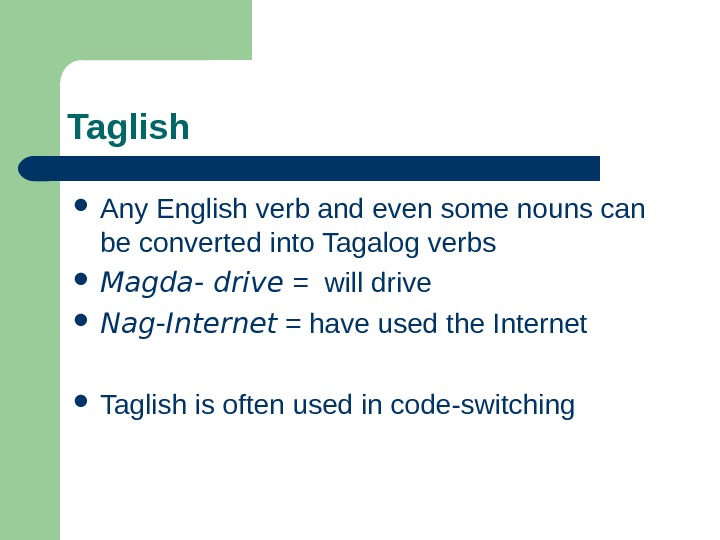
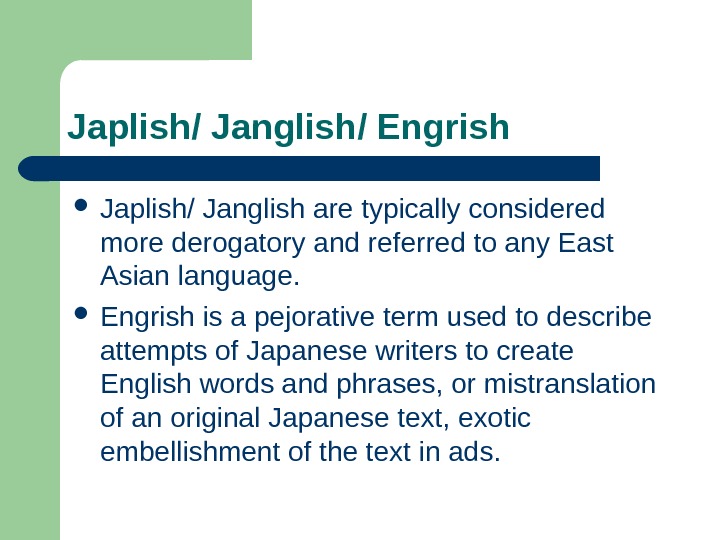
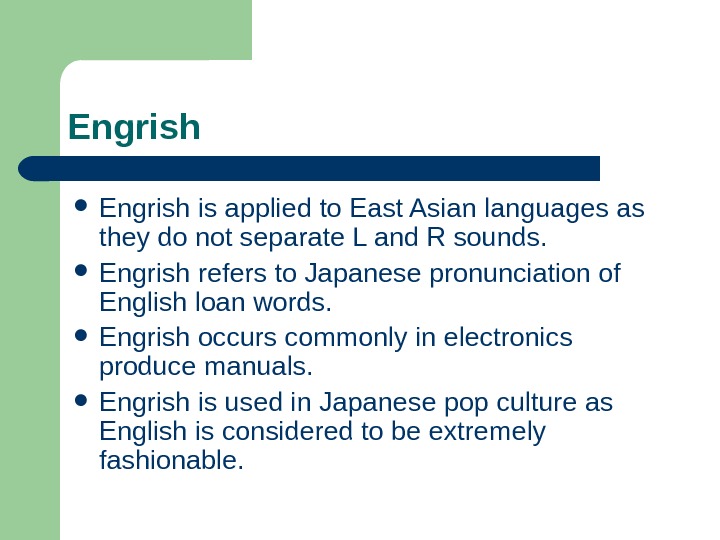
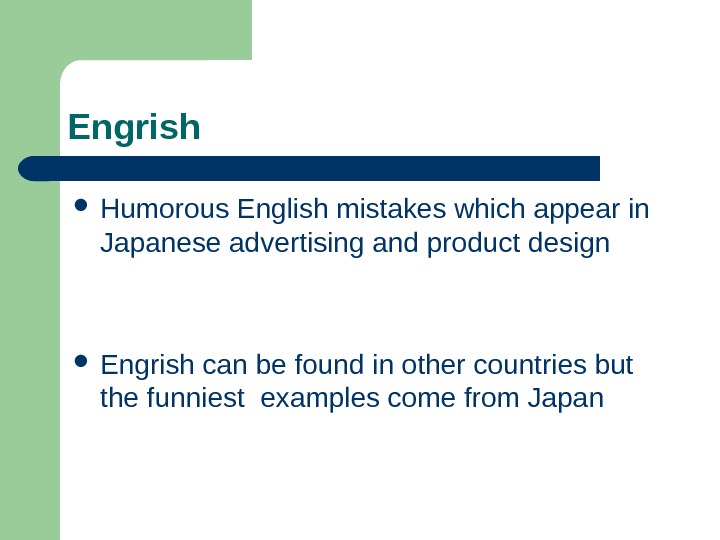
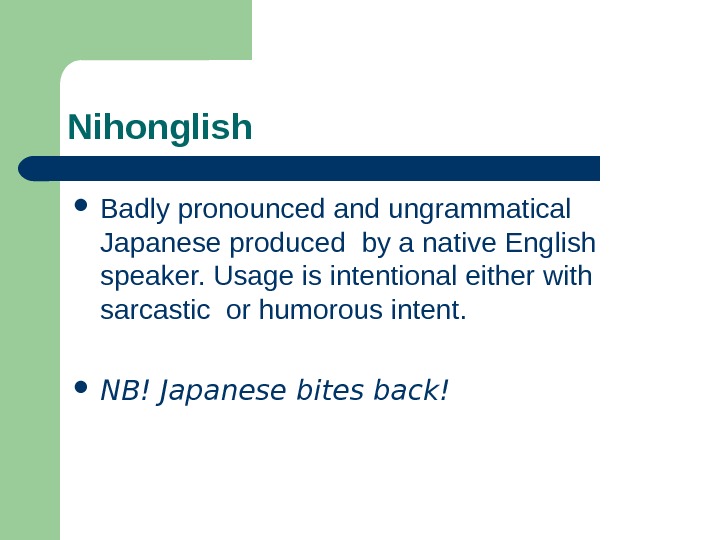
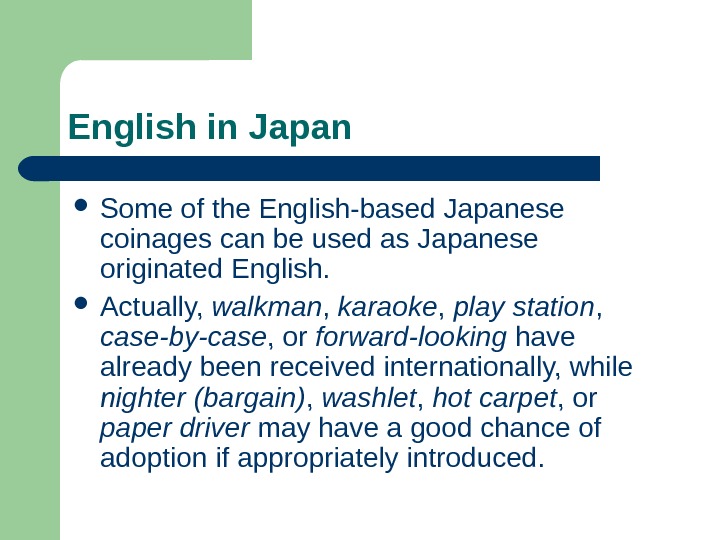
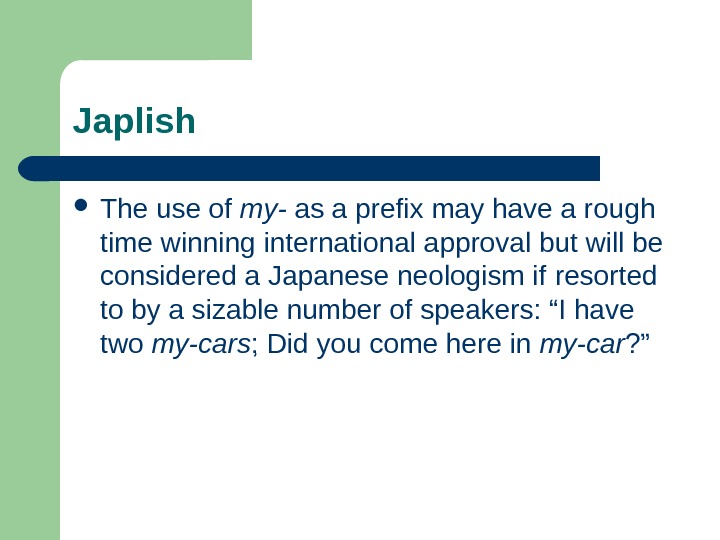
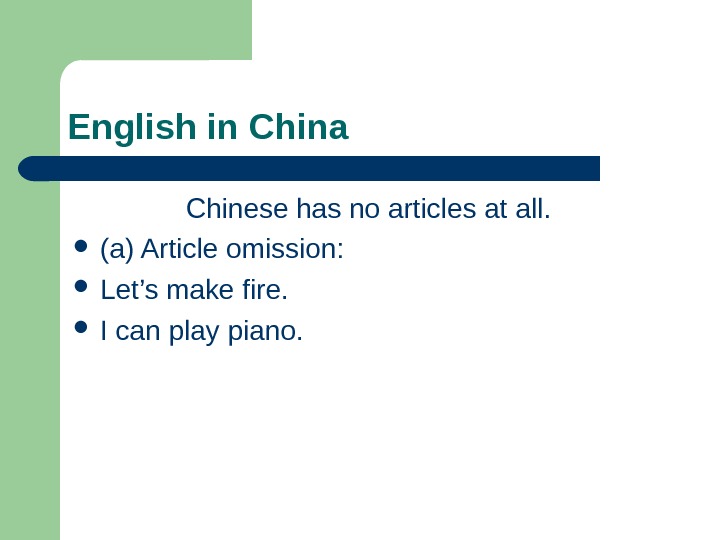
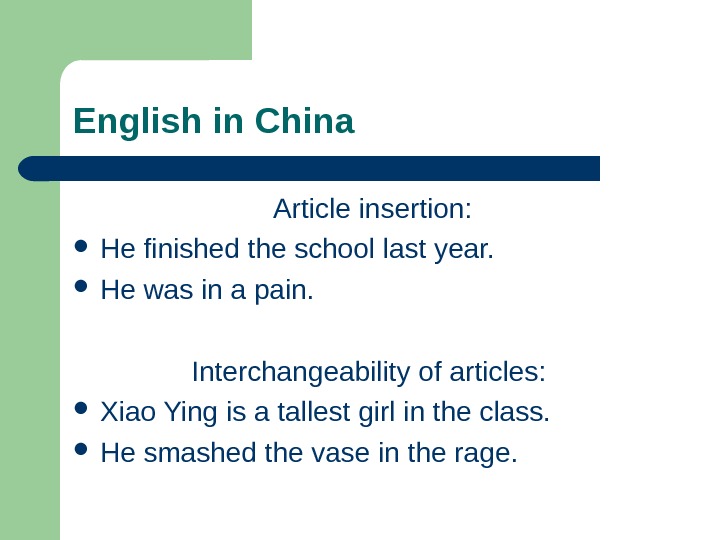
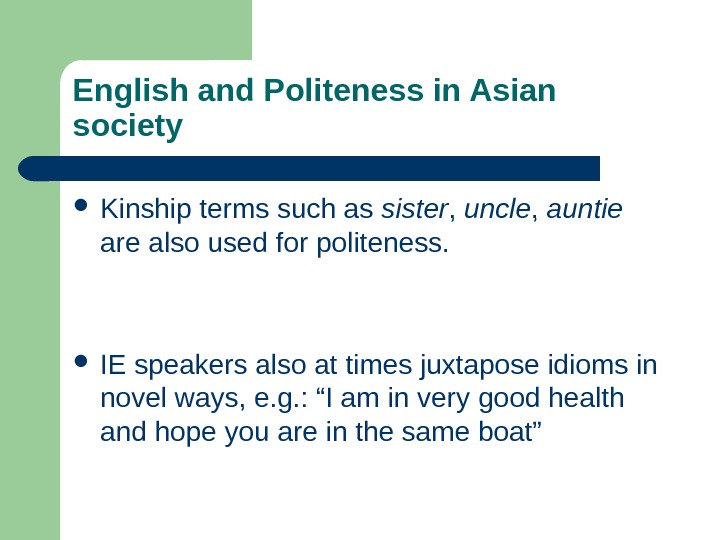
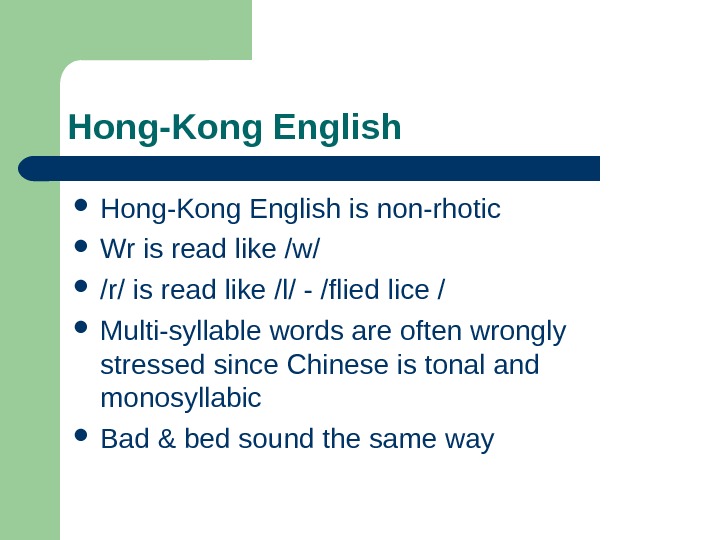
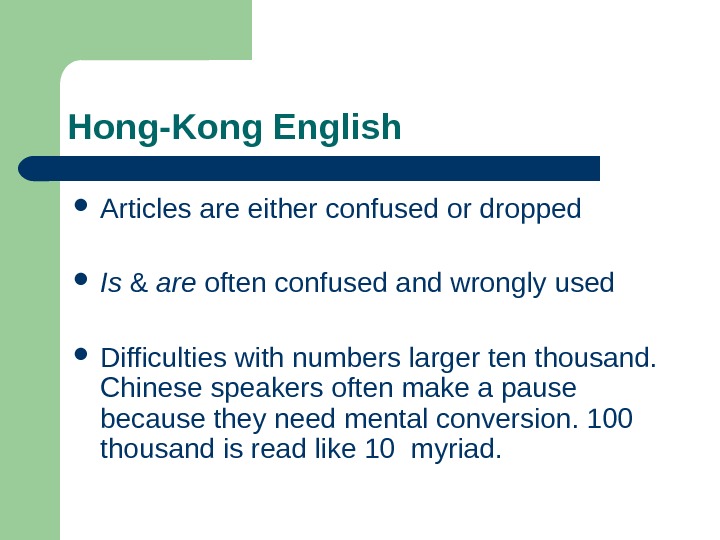
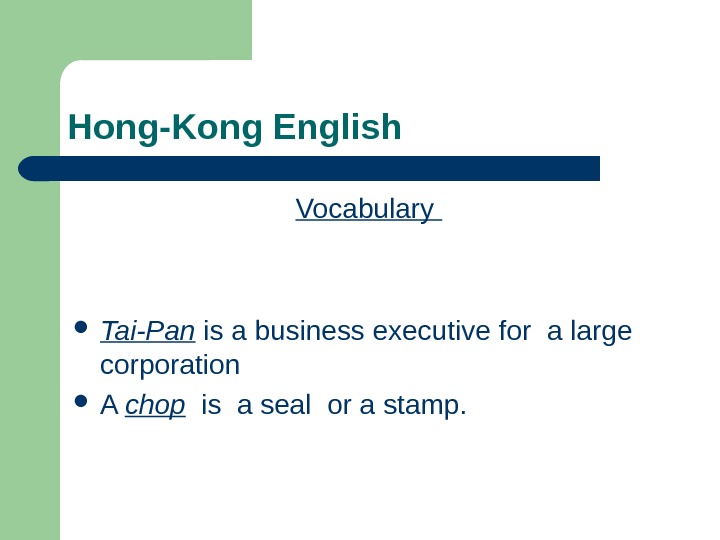
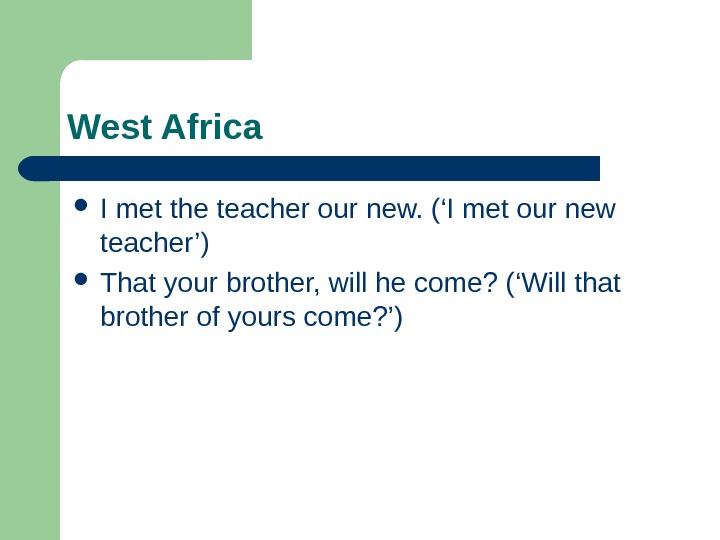
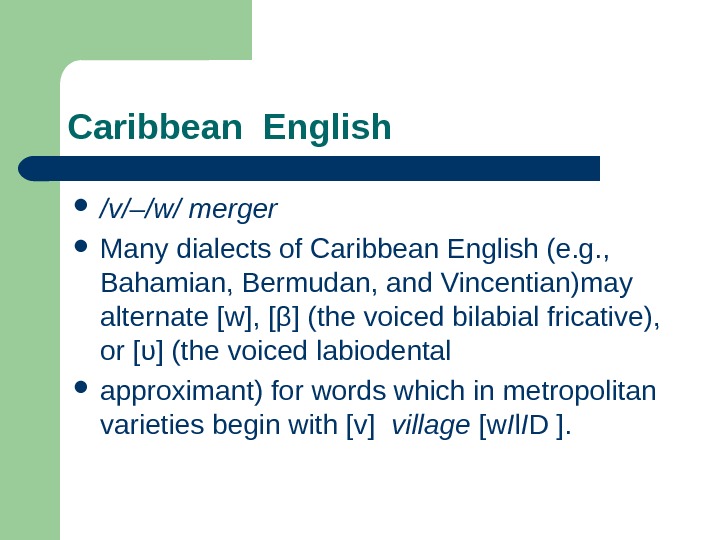
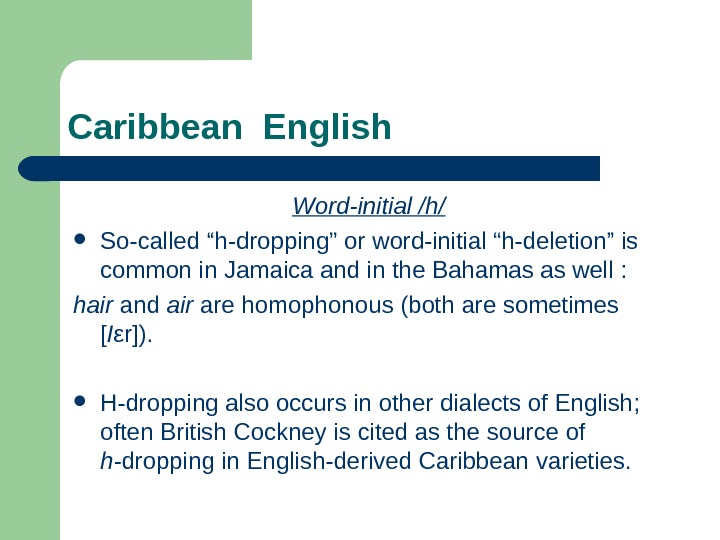
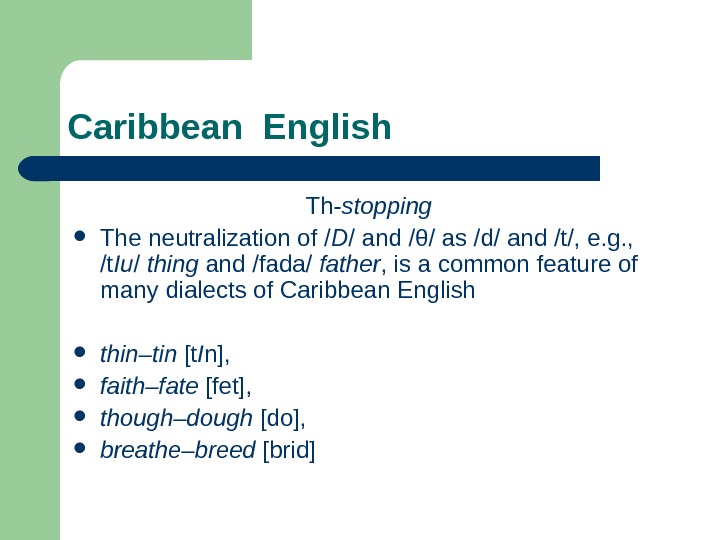
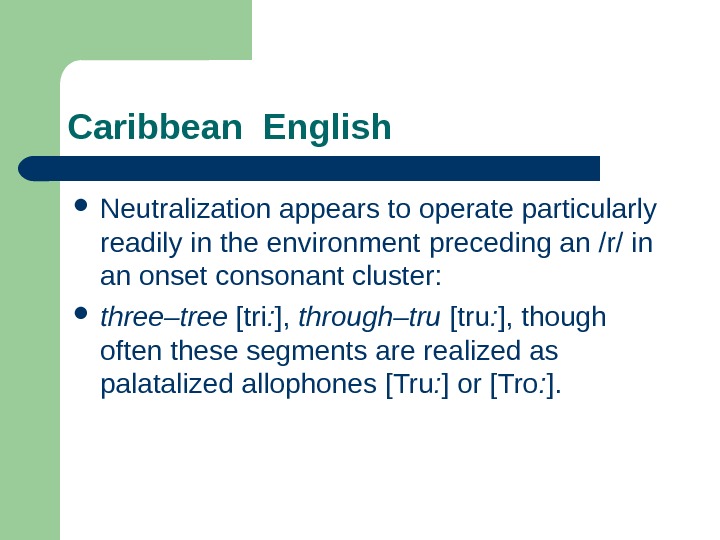
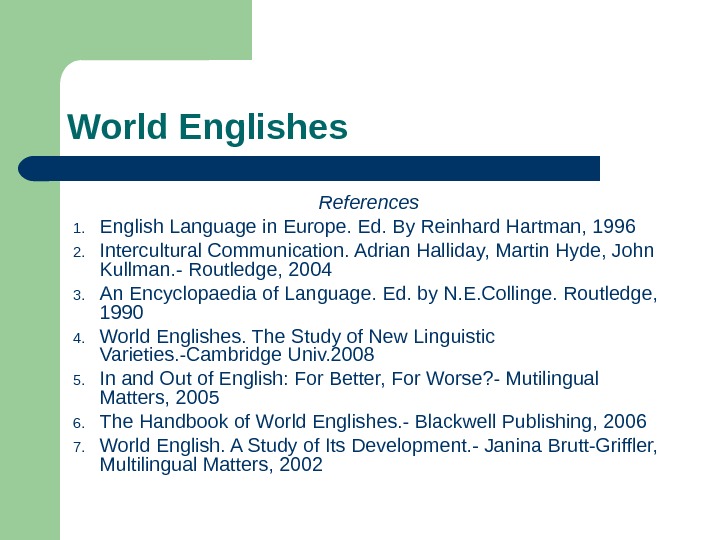
- Размер: 3.7 Mегабайта
- Количество слайдов: 115
Описание презентации English as a GLOCAL language World Englishes по слайдам
 English as a GLOCAL language World Englishes
English as a GLOCAL language World Englishes
 World Englishes Who owns English? Not Britain anymore. English is beyond Britain and Europe Englishness, Anglocentrism, Britocentrism, Britishness, VS Europeanness of English
World Englishes Who owns English? Not Britain anymore. English is beyond Britain and Europe Englishness, Anglocentrism, Britocentrism, Britishness, VS Europeanness of English
 World Englishes Modern concept of International English is a result of evolution. 1 st British colony in North America in 1607 became the first step towards globalization First Webster Dictionary in the 19 th century brought spelling division between Am. E and Br.
World Englishes Modern concept of International English is a result of evolution. 1 st British colony in North America in 1607 became the first step towards globalization First Webster Dictionary in the 19 th century brought spelling division between Am. E and Br.
 World English Initially British Lingaphone Company offered courses of language : English VS American English The term “British English” was non-existent English was viewed as real stuff and smth fundamental
World English Initially British Lingaphone Company offered courses of language : English VS American English The term “British English” was non-existent English was viewed as real stuff and smth fundamental
 Randolph Quirk 1962 The Use of English is no longer the possession of the British, or even the British and the Americans, but. . . exists in an increasingly large number of different varieties. . . But the most important development of all is seen in the emergence of varieties that are identified with and are specific to particular countries from among the former British colonies. In West Africa, in the West Indies, and in Pakistan and India. . . it is no longer accepted by the majority that the English of England, with RP as its accent, are the only possible models of English to be set before the young. (pp. 293)
Randolph Quirk 1962 The Use of English is no longer the possession of the British, or even the British and the Americans, but. . . exists in an increasingly large number of different varieties. . . But the most important development of all is seen in the emergence of varieties that are identified with and are specific to particular countries from among the former British colonies. In West Africa, in the West Indies, and in Pakistan and India. . . it is no longer accepted by the majority that the English of England, with RP as its accent, are the only possible models of English to be set before the young. (pp. 293)
 M. A. K. Halliday I myself came from the Inner Circle of Englishes, the OVEs (Old Variety of Englishes) as they are called in South-East Asia; so I would like to start by reminding you that within this circle there and always have been many different Englishes around. I’m not talking about the relatively recent worldwide varieties – British, North American, South African, Oceanic; but about the old dialects within Britain itself, Northumbrian, Mercian, Wessex, and Kentish at one period in the language’s history.
M. A. K. Halliday I myself came from the Inner Circle of Englishes, the OVEs (Old Variety of Englishes) as they are called in South-East Asia; so I would like to start by reminding you that within this circle there and always have been many different Englishes around. I’m not talking about the relatively recent worldwide varieties – British, North American, South African, Oceanic; but about the old dialects within Britain itself, Northumbrian, Mercian, Wessex, and Kentish at one period in the language’s history.
 World Englishes Among the varieties of English, there is a division into the “Old Englishes” (usually British, American, Australian, Canadian and a few others) and the “New Englishes” that have emerged in such nations as India, Nigeria, Singapore, and the Philippines.
World Englishes Among the varieties of English, there is a division into the “Old Englishes” (usually British, American, Australian, Canadian and a few others) and the “New Englishes” that have emerged in such nations as India, Nigeria, Singapore, and the Philippines.
 New Englishes It has become customary to use the plural form ‘Englishes’ to stress the diversity to be found in the language today, and to stress that English no longer has one single base of authority, prestige and normativity.
New Englishes It has become customary to use the plural form ‘Englishes’ to stress the diversity to be found in the language today, and to stress that English no longer has one single base of authority, prestige and normativity.
 Varieties of English A neutral term used to refer to any kind of language – a dialect , accent , sociolect , style or register Such a variety can be very general, such as “American English, ” or very specific, such as “the lower working-class dialect of the Lower East Side of New York City. ”
Varieties of English A neutral term used to refer to any kind of language – a dialect , accent , sociolect , style or register Such a variety can be very general, such as “American English, ” or very specific, such as “the lower working-class dialect of the Lower East Side of New York City. ”
 World Englishes Dialect Lingualect Variant Variation of English
World Englishes Dialect Lingualect Variant Variation of English
 Varieties of English The term “variety” is an academic term used for any kind of language production, whether we are viewing it as being determined by region, by gender, by social class, by age or by our own inimitable individual characteristics.
Varieties of English The term “variety” is an academic term used for any kind of language production, whether we are viewing it as being determined by region, by gender, by social class, by age or by our own inimitable individual characteristics.
 Varieties of English The concepts of language variety and variation lie at the heart of the world Englishes enterprise : “ varieties of English, ” “ localized varieties of English, ” “ non-native varieties of English, ” “ second-language varieties of English, ” and “ new varieties of English. ” The issue of linguistic variety is also central to both traditional dialectology and contemporary linguistics, where it is often subsumed into the study of language variation and change.
Varieties of English The concepts of language variety and variation lie at the heart of the world Englishes enterprise : “ varieties of English, ” “ localized varieties of English, ” “ non-native varieties of English, ” “ second-language varieties of English, ” and “ new varieties of English. ” The issue of linguistic variety is also central to both traditional dialectology and contemporary linguistics, where it is often subsumed into the study of language variation and change.
 Variety of Englishes Global Englishes International Englishes New Englishes World Englishes
Variety of Englishes Global Englishes International Englishes New Englishes World Englishes
 World Englishes ENL – English as a native language (anglophone speakers)- L 1 ESL — English a the second language L 2 EFL — English a a foreign language L 3 tripartite model NB! 110 territories worldwide, ex-USSR is not mentioned
World Englishes ENL – English as a native language (anglophone speakers)- L 1 ESL — English a the second language L 2 EFL — English a a foreign language L 3 tripartite model NB! 110 territories worldwide, ex-USSR is not mentioned
 World Englishes EIL — English as International language EILTS- English as International language Testing System – standard for Commonwealth countries
World Englishes EIL — English as International language EILTS- English as International language Testing System – standard for Commonwealth countries
 World Englishes English as a Second Language (ESL) English as a Foreign Language (EFL ) Immigrant Englishes : depending on a host of social and economic factors ( English in Mexico, Chicano English of the USA )
World Englishes English as a Second Language (ESL) English as a Foreign Language (EFL ) Immigrant Englishes : depending on a host of social and economic factors ( English in Mexico, Chicano English of the USA )
 NEW ENGLISHES AND CREOLISTICS It is in the above context that De. Camp (1971) coined the term post-creole continuum. Besides, basilectal and mesolectal features continue to co-exist in these communities, suggesting that Creole has not died yet.
NEW ENGLISHES AND CREOLISTICS It is in the above context that De. Camp (1971) coined the term post-creole continuum. Besides, basilectal and mesolectal features continue to co-exist in these communities, suggesting that Creole has not died yet.
 Creoloids The term ‘creoloid’ dates to Platt’s (1975) discussion of Singapore English, which arose under colonialism in a highly multilingual context that included several Chinese languages, Malay and Tamil. Platt noted several grammatical features of colloquial Singapore English that were reminiscent of creolisation: (a) variable lack of copula (b) more than one copula (c) variable marking of 3 rd person sg. for verbs (d) variable marking of past tense
Creoloids The term ‘creoloid’ dates to Platt’s (1975) discussion of Singapore English, which arose under colonialism in a highly multilingual context that included several Chinese languages, Malay and Tamil. Platt noted several grammatical features of colloquial Singapore English that were reminiscent of creolisation: (a) variable lack of copula (b) more than one copula (c) variable marking of 3 rd person sg. for verbs (d) variable marking of past tense
 Contact Linguistics and World Englishes The field of creolistics (or pidgin and creole linguistics) has shown how detailed archival research can illuminate earlier forms of contact languages and offer a firmer foundation against which to test characterizations of creoles and theories of creolization.
Contact Linguistics and World Englishes The field of creolistics (or pidgin and creole linguistics) has shown how detailed archival research can illuminate earlier forms of contact languages and offer a firmer foundation against which to test characterizations of creoles and theories of creolization.
 Tom Mc. Arthur’s Circle of World English (1987)
Tom Mc. Arthur’s Circle of World English (1987)
 Tom Mc. Arthur’s Circle of World English (1987)
Tom Mc. Arthur’s Circle of World English (1987)
 Manfred GЁorlach’s Circle model of English (GЁorlach 1990)
Manfred GЁorlach’s Circle model of English (GЁorlach 1990)

 Braj Kachru’s Circles model of World Englishes
Braj Kachru’s Circles model of World Englishes

 The Three Circles of B. Kachru 1985 The “Three Circles of English” : the “Inner, ” — the societies where English is the “primary language, ” i. e. , the USA, the UK, Canada, Australia, and New Zealand “ Outer, ” postcolonial Anglophonic contexts, a numerically large and diverse speech community, including such African and Asian societies as Nigeria, Zambia, India, and Singapore. “ Expanding ” Circles.
The Three Circles of B. Kachru 1985 The “Three Circles of English” : the “Inner, ” — the societies where English is the “primary language, ” i. e. , the USA, the UK, Canada, Australia, and New Zealand “ Outer, ” postcolonial Anglophonic contexts, a numerically large and diverse speech community, including such African and Asian societies as Nigeria, Zambia, India, and Singapore. “ Expanding ” Circles.
 The Three Circles of B. Kachru 1985 The Expanding Circle is defined as comprising those areas where English is an “international language” and traditionally regarded as societies learning English as a Foreign Language (EFL) — China, Greece, Indonesia, Israel, Japan, Korea, Saudi Arabia, Taiwan, and the USSR
The Three Circles of B. Kachru 1985 The Expanding Circle is defined as comprising those areas where English is an “international language” and traditionally regarded as societies learning English as a Foreign Language (EFL) — China, Greece, Indonesia, Israel, Japan, Korea, Saudi Arabia, Taiwan, and the USSR
 The Three Circles of B. Kachru 1985 The Circles model was intended to represent (1) the types of spread of English worldwide, (2) the patterns of acquisition , and (3) the functional domains in which English is used internationally.
The Three Circles of B. Kachru 1985 The Circles model was intended to represent (1) the types of spread of English worldwide, (2) the patterns of acquisition , and (3) the functional domains in which English is used internationally.
 World Englishes Division between Standardisation & diversification Intellibility & practicality
World Englishes Division between Standardisation & diversification Intellibility & practicality
 Multiple Mixing and World Englishes mixing of world Englishes, mixing of world English accents, mixing of English with other languages, mixing of English with non-Roman scripts.
Multiple Mixing and World Englishes mixing of world Englishes, mixing of world English accents, mixing of English with other languages, mixing of English with non-Roman scripts.
 New Englishes. Standards Metropolitan standards : The term would have once been applicable only to standard English of England.
New Englishes. Standards Metropolitan standards : The term would have once been applicable only to standard English of England.
 New Englishes Colonial standards : The colonial history of English has made it an important language in Australia, New Zealand, Canada, South Africa and Northern and Southern Rhodesia (now Zambia and Zimbabwe). The varieties spoken there are referred to in historical dialectology as ‘extraterritorial’ Englishes.
New Englishes Colonial standards : The colonial history of English has made it an important language in Australia, New Zealand, Canada, South Africa and Northern and Southern Rhodesia (now Zambia and Zimbabwe). The varieties spoken there are referred to in historical dialectology as ‘extraterritorial’ Englishes.
 New Englishes Regional dialects : These are the varieties that may be distinguished on the basis of regional variation within metropolis and colony.
New Englishes Regional dialects : These are the varieties that may be distinguished on the basis of regional variation within metropolis and colony.
 New Englishes Social dialects : identifiable varieties within a region along the lines of class and ethnicity may occur. In London there is the difference between Cockney of the working classes, Received pronunciation (RP) ‘ Estuary English’ (Rosewarne 1994).
New Englishes Social dialects : identifiable varieties within a region along the lines of class and ethnicity may occur. In London there is the difference between Cockney of the working classes, Received pronunciation (RP) ‘ Estuary English’ (Rosewarne 1994).
 New Englishes. Standards Pidgin Englishes : Pidgins are defined prototypically as rudimentary languages that have no native speakers, though they may subsequently gain in complexity. Creole Englishes : These languages are ‘mixed’ in the sense that typically their grammars and lexicons come from different sources
New Englishes. Standards Pidgin Englishes : Pidgins are defined prototypically as rudimentary languages that have no native speakers, though they may subsequently gain in complexity. Creole Englishes : These languages are ‘mixed’ in the sense that typically their grammars and lexicons come from different sources
 New Englishes. Standards Language-shift Englishes : These are varieties that develop when English replaces the primary language(s) of a community. Thus Hiberno English is probably best classified as a social dialect in most areas of Ireland today; not so long ago it would have counted as a language-shift variety, with L 1 and L 2 speakers of the dialect closely interacting with each other
New Englishes. Standards Language-shift Englishes : These are varieties that develop when English replaces the primary language(s) of a community. Thus Hiberno English is probably best classified as a social dialect in most areas of Ireland today; not so long ago it would have counted as a language-shift variety, with L 1 and L 2 speakers of the dialect closely interacting with each other
 New Englishes. Standards Hybrid Englishes : Also called ‘bilingual mixed languages’, these are versions of English which occur in code-mixing in many urban centres where a local language comes into contact with English ( hybrid Hindi-English )
New Englishes. Standards Hybrid Englishes : Also called ‘bilingual mixed languages’, these are versions of English which occur in code-mixing in many urban centres where a local language comes into contact with English ( hybrid Hindi-English )
 World English. Agenda Education, language and the rights of the child American English as a medium of intercultural communication WE – response to globalization British attitude towards variability of English
World English. Agenda Education, language and the rights of the child American English as a medium of intercultural communication WE – response to globalization British attitude towards variability of English
 World English Ghana ( Семенец О. Е. , 1985) Linguist – a person who speaks on behalf of a tribe leader Oracle — herbalist (Quack — in Western Africa)
World English Ghana ( Семенец О. Е. , 1985) Linguist – a person who speaks on behalf of a tribe leader Oracle — herbalist (Quack — in Western Africa)
 World Englishes Ghana Cover cloth — overcoat Canvas – shoes A motor — bicycle Storey – (storeyhouse) – more than
World Englishes Ghana Cover cloth — overcoat Canvas – shoes A motor — bicycle Storey – (storeyhouse) – more than
 World Englishes Ghana Electrolux – any fridge Colgate — any — Kodak — any — Hoover — any – To take seed/ to take in — to become pregnant
World Englishes Ghana Electrolux – any fridge Colgate — any — Kodak — any — Hoover — any – To take seed/ to take in — to become pregnant
 World Englishes Franglaise = Frenglish Germish = Denglish Swedlish Spanglish Janglish = Japlish Konglish (Korea) Portuguish
World Englishes Franglaise = Frenglish Germish = Denglish Swedlish Spanglish Janglish = Japlish Konglish (Korea) Portuguish
 Common Features of WE Many New Englishes show a greater preference forming yes/no questions by a rising intonation pattern, rather than by auxiliary inversion. She’s coming tomorrow? (=‘Is she coming tomorrow? ’ – Ind. SAf Eng) She promised you? (Sgp Eng) Anthony learned this from you or you learned this from Anthony? (Sgp Eng)
Common Features of WE Many New Englishes show a greater preference forming yes/no questions by a rising intonation pattern, rather than by auxiliary inversion. She’s coming tomorrow? (=‘Is she coming tomorrow? ’ – Ind. SAf Eng) She promised you? (Sgp Eng) Anthony learned this from you or you learned this from Anthony? (Sgp Eng)
 Common Features of WE To my sister sometime I speak English. (Sgp Eng) Q: Zulu? (i. e. Do you speak Zulu as well? ) A: Yah, and Zulu I speak.
Common Features of WE To my sister sometime I speak English. (Sgp Eng) Q: Zulu? (i. e. Do you speak Zulu as well? ) A: Yah, and Zulu I speak.
 Common Features of WE Bokamba (1992: 138 —40) notes a common tendency in sub-Saharan African Eng to reduplicate adjectives to form adverbs: Quickquick ‘quickly’; small-small ‘in small doses’; slow-slow ‘slowly’. Kachru notes examples like different-different things and one-one piece. The semantics here is distributive, with a stylistic nuance of emphasis.
Common Features of WE Bokamba (1992: 138 —40) notes a common tendency in sub-Saharan African Eng to reduplicate adjectives to form adverbs: Quickquick ‘quickly’; small-small ‘in small doses’; slow-slow ‘slowly’. Kachru notes examples like different-different things and one-one piece. The semantics here is distributive, with a stylistic nuance of emphasis.
 World Englishes In Ind Eng wh- words can be reduplicated with the semantics ‘plural/distributive’ based on details of the syntax of the Indic substrates. Who-who came? (= ‘Who (of several people) came? ) What-what they said? (= ‘What (different) things did they say? ’)
World Englishes In Ind Eng wh- words can be reduplicated with the semantics ‘plural/distributive’ based on details of the syntax of the Indic substrates. Who-who came? (= ‘Who (of several people) came? ) What-what they said? (= ‘What (different) things did they say? ’)
 Common Features of WE The use of -s plural markers is overgeneralized. luggages , furnitures , firewoods , or grasses discontents , informations
Common Features of WE The use of -s plural markers is overgeneralized. luggages , furnitures , firewoods , or grasses discontents , informations
 Divergence NURSE There is immense variation in the realisation of the NURSE vowel: [a] in northern Nig Eng and as a lesser alternative in Ind Eng; [ε] in SAf Eng, southern Nig Eng, Ghan Eng, in the rhotic Phl Eng; and as a lesser alternative in Cam Eng; [a] in EAfr Eng and as a lesser alternative in Nig Eng; [ ] in Cam Eng; ɔ [ ] in Sgp Eng, Mal Eng and as a lesser alternative in Ind Eng; ə
Divergence NURSE There is immense variation in the realisation of the NURSE vowel: [a] in northern Nig Eng and as a lesser alternative in Ind Eng; [ε] in SAf Eng, southern Nig Eng, Ghan Eng, in the rhotic Phl Eng; and as a lesser alternative in Cam Eng; [a] in EAfr Eng and as a lesser alternative in Nig Eng; [ ] in Cam Eng; ɔ [ ] in Sgp Eng, Mal Eng and as a lesser alternative in Ind Eng; ə
 Singlish English in Singapore = English –based creole spoken colloquially in Singapore Numerous cases of code-switching (Chinese, Malay, Tamil) Broken English/ bad English → Speak Good English Movement Schools discourage students from taking Singlish
Singlish English in Singapore = English –based creole spoken colloquially in Singapore Numerous cases of code-switching (Chinese, Malay, Tamil) Broken English/ bad English → Speak Good English Movement Schools discourage students from taking Singlish
 Singlish is often used for humorous effect, when the audience is local In the Army Coffee-shops & restaurants
Singlish is often used for humorous effect, when the audience is local In the Army Coffee-shops & restaurants
 Singlish Sociolect phenomenon Acrolectal — high-class form, well-educated people in informal situations, close to Br. E This guy’s Singlish is very good
Singlish Sociolect phenomenon Acrolectal — high-class form, well-educated people in informal situations, close to Br. E This guy’s Singlish is very good
 Singlish Mesolectal – middle class, semi-formal situations Dis guy Singlish very powerful one
Singlish Mesolectal – middle class, semi-formal situations Dis guy Singlish very powerful one
 Singlish Basilectal – colloquial, unique lexical, phonological & grammatical features Dis guy Singlish is bey powerful one
Singlish Basilectal – colloquial, unique lexical, phonological & grammatical features Dis guy Singlish is bey powerful one
 Singlish Sometimes, analysts prefer to use the terms basilang , mesolang and acrolang , rather than basilect, mesolect and acrolect , to emphasise that they are dealing with developing competence in an L
Singlish Sometimes, analysts prefer to use the terms basilang , mesolang and acrolang , rather than basilect, mesolect and acrolect , to emphasise that they are dealing with developing competence in an L
 Singlish Phonology /p/ t/ k/ become unaspirated esp among Malay Singaporeans → Pat, tin, come → bat, din, gum /t/ /d/ → three → tree, then → den
Singlish Phonology /p/ t/ k/ become unaspirated esp among Malay Singaporeans → Pat, tin, come → bat, din, gum /t/ /d/ → three → tree, then → den
 Singlish Phonology The distinction between /l/ & /r/ not found at basilectal level — “Use your blain !” Plural – s is often omitted which might be the result of Chinese influence which does not distinguish between single and plural forms
Singlish Phonology The distinction between /l/ & /r/ not found at basilectal level — “Use your blain !” Plural – s is often omitted which might be the result of Chinese influence which does not distinguish between single and plural forms
 Singlish Phonology Singlish is syllable-timed compared with other varierties of English which are stress-timed Pitch tones are well-defined, tones resemble Chinese Singlish tends to preserve tone of loan words from Mandarin and other languages
Singlish Phonology Singlish is syllable-timed compared with other varierties of English which are stress-timed Pitch tones are well-defined, tones resemble Chinese Singlish tends to preserve tone of loan words from Mandarin and other languages
 Singlish Grammar Nouns are optionally marked for plurality. Articles are optional too. He can play piano. I like to read novel. Your computer got virus one, izzit?
Singlish Grammar Nouns are optionally marked for plurality. Articles are optional too. He can play piano. I like to read novel. Your computer got virus one, izzit?
 Singlish As a copular and auxiliary verb be is often omitted: Dis house very nice Dat car not worth the money You looking for trouble, izzit?
Singlish As a copular and auxiliary verb be is often omitted: Dis house very nice Dat car not worth the money You looking for trouble, izzit?
 Singlish Past Tense markers are optional : He talk for so long, never stop, not even when I ask him. I eat liao ( I ate or I have eaten) How come he never pay just now? (Negation+ past tense marker)
Singlish Past Tense markers are optional : He talk for so long, never stop, not even when I ask him. I eat liao ( I ate or I have eaten) How come he never pay just now? (Negation+ past tense marker)
 Singlish Grammar Interrogative This book you want or not? Can or not? They never study, is it? You don’t like that, is it?
Singlish Grammar Interrogative This book you want or not? Can or not? They never study, is it? You don’t like that, is it?
 Singlish Grammar Reduplication My boy-boy is going to primary school. We two friend-friend one. Want to go Orher walk see or not? (Orchard Road) You got take the small-small one.
Singlish Grammar Reduplication My boy-boy is going to primary school. We two friend-friend one. Want to go Orher walk see or not? (Orchard Road) You got take the small-small one.
 Singlish Grammar Kena is an auxiliary to mark the passive voice: He was scolded – He kena scold (negative evauation) VS * he kena praised.
Singlish Grammar Kena is an auxiliary to mark the passive voice: He was scolded – He kena scold (negative evauation) VS * he kena praised.
 Singlish Discouse Particles Lah — Drink, lah! – Come on, drink! ( in the end of the sentence to assert solidarity) What / wat/ — But he very good at sports what! Mah – This one can also work mah! Leh – command, complaint, claim : Give me leh!
Singlish Discouse Particles Lah — Drink, lah! – Come on, drink! ( in the end of the sentence to assert solidarity) What / wat/ — But he very good at sports what! Mah – This one can also work mah! Leh – command, complaint, claim : Give me leh!
 Pragmatics and Discourse Daughter: Mum, it’s private. How can I let you read it? Mother: Can la. I’m your own mother. Wife: You bought cheese, Farouk? (= ‘Did you buy cheese, Farouk? ’) Husband: No’, but lot butter I bought. (= ‘No, though I did buy a lot of butter’) (No’ = [noυ])
Pragmatics and Discourse Daughter: Mum, it’s private. How can I let you read it? Mother: Can la. I’m your own mother. Wife: You bought cheese, Farouk? (= ‘Did you buy cheese, Farouk? ’) Husband: No’, but lot butter I bought. (= ‘No, though I did buy a lot of butter’) (No’ = [noυ])
 Pragmatics and Discourse A: Why didn’t you come in? B: You told me to wait here, what
Pragmatics and Discourse A: Why didn’t you come in? B: You told me to wait here, what
 Singlish Bao (2005: 239) discusses yet another perfective innovation in Sgp Eng: the use of aspectual ever , as in I ever see the movie. (= ‘I have seen the movie’) This share ever hit forty dollars. (= ‘This share was once forty dollars’)
Singlish Bao (2005: 239) discusses yet another perfective innovation in Sgp Eng: the use of aspectual ever , as in I ever see the movie. (= ‘I have seen the movie’) This share ever hit forty dollars. (= ‘This share was once forty dollars’)
 Singlish Existential be versus get: In some varieties existential be is replaced by got, especially in the phrase there is/exists : Here got very many people. (= ‘There are many people here’ Got one ghost over there (= ‘There’s a ghost over there’ – basilect)
Singlish Existential be versus get: In some varieties existential be is replaced by got, especially in the phrase there is/exists : Here got very many people. (= ‘There are many people here’ Got one ghost over there (= ‘There’s a ghost over there’ – basilect)
 Singlish vocabulary Chop – stamp – “eh, your passport got kens chop or not ah? ’ Follow – accompany – Can I follow? ”
Singlish vocabulary Chop – stamp – “eh, your passport got kens chop or not ah? ’ Follow – accompany – Can I follow? ”
 Singlish vocabulary Eye –power – sb who watches how others work My English not powerful Got problem is it? — aggressive
Singlish vocabulary Eye –power – sb who watches how others work My English not powerful Got problem is it? — aggressive
 English in Singapore. LPP However, the state has recently argued that, in addition to heritage reasons, Mandarin should also be learned in order to take advantage of China’s growing economy, thereby actively conceding that instrumental value is an important motivating factor in language choice. As a result, Mandarin is now becoming so popular that a growing number of non- Chinese parents want schools to allow their children to study the language.
English in Singapore. LPP However, the state has recently argued that, in addition to heritage reasons, Mandarin should also be learned in order to take advantage of China’s growing economy, thereby actively conceding that instrumental value is an important motivating factor in language choice. As a result, Mandarin is now becoming so popular that a growing number of non- Chinese parents want schools to allow their children to study the language.
 English in Singapore. LPP This new emphasis on Mandarin as a language commodity has led to concerns within the Chinese community that the language is being learnt for the ‘wrong’ reasons: the language is being treated less as an emblem of local ethnicity and more as an economic resource for conducting business negotiations with China.
English in Singapore. LPP This new emphasis on Mandarin as a language commodity has led to concerns within the Chinese community that the language is being learnt for the ‘wrong’ reasons: the language is being treated less as an emblem of local ethnicity and more as an economic resource for conducting business negotiations with China.
 English in Singapore. LPP More generally, these developments potentially undermine the multiracial logic of the policy, since the equal status that all three mother tongues are supposed to enjoy is compromised by the fact that neither Malay nor Tamil can be claimed to enjoy the same level of economic cachet as Mandarin
English in Singapore. LPP More generally, these developments potentially undermine the multiracial logic of the policy, since the equal status that all three mother tongues are supposed to enjoy is compromised by the fact that neither Malay nor Tamil can be claimed to enjoy the same level of economic cachet as Mandarin
 Manglish / Malgish Variant of colloquial English spoken in Malaysia. The language shares a substantial pool with Singlish, some experts claim they are the same languages with a few slang words found in one and non-existent in another.
Manglish / Malgish Variant of colloquial English spoken in Malaysia. The language shares a substantial pool with Singlish, some experts claim they are the same languages with a few slang words found in one and non-existent in another.
 Manglish / Malgish Malay is the country’s official language since 1968. As English is widely spoken, many Malay words penetrated into informal English or Mangled English. The impact of other languages ( Mandarin, Cantonese, Tamil, Hokkien) spoken in Malaysia is also taken into account.
Manglish / Malgish Malay is the country’s official language since 1968. As English is widely spoken, many Malay words penetrated into informal English or Mangled English. The impact of other languages ( Mandarin, Cantonese, Tamil, Hokkien) spoken in Malaysia is also taken into account.
 Manglish Many speakers of Manglish belonging to various ethnic groups tend to pepper their speech with the words from their mother tongue which is the example of code-switching
Manglish Many speakers of Manglish belonging to various ethnic groups tend to pepper their speech with the words from their mother tongue which is the example of code-switching
 Manglish / Malgish Manglish particles Lah – used in the end of the sentence to affirm a statement which often ends with an exclamation mark Don’t be an idiot lah! Mah – less intensive than lah She’s like that mah
Manglish / Malgish Manglish particles Lah – used in the end of the sentence to affirm a statement which often ends with an exclamation mark Don’t be an idiot lah! Mah – less intensive than lah She’s like that mah
 Manglish / Malgish Manglish particles Liao — means ‘ already’ No more liao! Meh – used in questions , often skeptical Really meh
Manglish / Malgish Manglish particles Liao — means ‘ already’ No more liao! Meh – used in questions , often skeptical Really meh
 Manglish / Malgish Manglish particles Lor — used when explaining smth Like that lor! One — used as an emphasis in the end of the sentence Why is she so naughty one?
Manglish / Malgish Manglish particles Lor — used when explaining smth Like that lor! One — used as an emphasis in the end of the sentence Why is she so naughty one?
 Manglish / Malgish Manglish particles What — unlike AE & Br. E is used with an exclamation mark What! How could you do that?
Manglish / Malgish Manglish particles What — unlike AE & Br. E is used with an exclamation mark What! How could you do that?
 Manglish Vocabulary Kapster – a talkative person Blur – confused Jalan – to walk Kena – to get caught Makan – to eat Minum – to drink
Manglish Vocabulary Kapster – a talkative person Blur – confused Jalan – to walk Kena – to get caught Makan – to eat Minum – to drink
 Manglish Vocabulary On/ off — to activate/ deactivate Pon – to skip school Saman – to issue a traffic ticket
Manglish Vocabulary On/ off — to activate/ deactivate Pon – to skip school Saman – to issue a traffic ticket
 Manglish Vocabulary Exclamations Best/ syok – indicates that the object is superlatively good Die/ finish/ gone – to indicate trouble like English ‘damn it’
Manglish Vocabulary Exclamations Best/ syok – indicates that the object is superlatively good Die/ finish/ gone – to indicate trouble like English ‘damn it’
 Manglish Vocabulary Many things were borrowed from Chinese dialects: Why are you so like that one? = Why are you behaving in that way? (Br. E)
Manglish Vocabulary Many things were borrowed from Chinese dialects: Why are you so like that one? = Why are you behaving in that way? (Br. E)
 Manglish Spelling Lately strongly affected by AE ( documents, web) For most cases Manglish is a spoken tongue
Manglish Spelling Lately strongly affected by AE ( documents, web) For most cases Manglish is a spoken tongue
 Manglish Vocabulary HP ( handphone) — mobile/ cell phone KIV – keep in view — keep for further consideration Outstation — out of town/ overseas MC – He is on MC today ( medical certificate) — sick note
Manglish Vocabulary HP ( handphone) — mobile/ cell phone KIV – keep in view — keep for further consideration Outstation — out of town/ overseas MC – He is on MC today ( medical certificate) — sick note
 Manglish Vocabulary Can — yes/ alright Cannot — no Photostat — photocopy, Xerox
Manglish Vocabulary Can — yes/ alright Cannot — no Photostat — photocopy, Xerox
 Manglish Vocabulary Different meanings Driver — a personal chauffeur/ odd job man, often sent on errand Alphabet – a letter of alphabet ( The word ‘vase’ has four alphabets.
Manglish Vocabulary Different meanings Driver — a personal chauffeur/ odd job man, often sent on errand Alphabet – a letter of alphabet ( The word ‘vase’ has four alphabets.
 Manglish Vocabulary Bungalow — a mansion for the rich and/ or famous
Manglish Vocabulary Bungalow — a mansion for the rich and/ or famous
 Philippine English functions in Manila since 1762 when the British invaded the country, but got rooted in 1898 when the USA took the government. Americans set up education system with English as the language of education.
Philippine English functions in Manila since 1762 when the British invaded the country, but got rooted in 1898 when the USA took the government. Americans set up education system with English as the language of education.
 Philippine English After independence the Philippines government followed the same line with parallel usage of Filipino. In private schools arranged by Catholic Church dual system is valid and English prevails.
Philippine English After independence the Philippines government followed the same line with parallel usage of Filipino. In private schools arranged by Catholic Church dual system is valid and English prevails.
 Philippine English Nearly all people of Philippines are bilingual at least as they speak one of the local languages (Tagalog, Ilokano, Cebuano) and Filipino/ or English as their second language. Many children speak English as their first language.
Philippine English Nearly all people of Philippines are bilingual at least as they speak one of the local languages (Tagalog, Ilokano, Cebuano) and Filipino/ or English as their second language. Many children speak English as their first language.
 Philippine English American spelling prevails. Educated people prefer American pronunciation. Mispronunciation lead /i/ as in leader salmon / l/ is pronounced climber / b/ is pronounced
Philippine English American spelling prevails. Educated people prefer American pronunciation. Mispronunciation lead /i/ as in leader salmon / l/ is pronounced climber / b/ is pronounced
 Philippine English Wrong syllables are stressed: Comfortable — /kom. FORtabl/ Preferable /pre. FERabl/ Admirable /ad. MYrabl/ Category /ka. TEGori/ Ceremony /se. REmoni/
Philippine English Wrong syllables are stressed: Comfortable — /kom. FORtabl/ Preferable /pre. FERabl/ Admirable /ad. MYrabl/ Category /ka. TEGori/ Ceremony /se. REmoni/
 Philippine English Short /u/ turns into long /u/: Frustration / froostr. . / Suspend /soospend/ T, k, p are pronounced without aspiration
Philippine English Short /u/ turns into long /u/: Frustration / froostr. . / Suspend /soospend/ T, k, p are pronounced without aspiration
 Philippine English Vocabulary and usage C. R. – Comfort Room = toilet, bathroom Get/ go down the bus – get off the bus Open/ close the light – Switch on/off the Every now and then — often
Philippine English Vocabulary and usage C. R. – Comfort Room = toilet, bathroom Get/ go down the bus – get off the bus Open/ close the light – Switch on/off the Every now and then — often
 Taglish Any English verb and even some nouns can be converted into Tagalog verbs Magda- drive = will drive Nag-Internet = have used the Internet Taglish is often used in code-switching
Taglish Any English verb and even some nouns can be converted into Tagalog verbs Magda- drive = will drive Nag-Internet = have used the Internet Taglish is often used in code-switching
 Japlish/ Janglish/ Engrish Japlish/ Janglish are typically considered more derogatory and referred to any East Asian language. Engrish is a pejorative term used to describe attempts of Japanese writers to create English words and phrases, or mistranslation of an original Japanese text, exotic embellishment of the text in ads.
Japlish/ Janglish/ Engrish Japlish/ Janglish are typically considered more derogatory and referred to any East Asian language. Engrish is a pejorative term used to describe attempts of Japanese writers to create English words and phrases, or mistranslation of an original Japanese text, exotic embellishment of the text in ads.
 Engrish is applied to East Asian languages as they do not separate L and R sounds. Engrish refers to Japanese pronunciation of English loan words. Engrish occurs commonly in electronics produce manuals. Engrish is used in Japanese pop culture as English is considered to be extremely fashionable.
Engrish is applied to East Asian languages as they do not separate L and R sounds. Engrish refers to Japanese pronunciation of English loan words. Engrish occurs commonly in electronics produce manuals. Engrish is used in Japanese pop culture as English is considered to be extremely fashionable.
 Engrish Humorous English mistakes which appear in Japanese advertising and product design Engrish can be found in other countries but the funniest examples come from Japan
Engrish Humorous English mistakes which appear in Japanese advertising and product design Engrish can be found in other countries but the funniest examples come from Japan
 Nihonglish Badly pronounced and ungrammatical Japanese produced by a native English speaker. Usage is intentional either with sarcastic or humorous intent. NB! Japanese bites back!
Nihonglish Badly pronounced and ungrammatical Japanese produced by a native English speaker. Usage is intentional either with sarcastic or humorous intent. NB! Japanese bites back!
 English in Japan Some of the English-based Japanese coinages can be used as Japanese originated English. Actually, walkman , karaoke , play station , case-by-case , or forward-looking have already been received internationally, while nighter (bargain) , washlet , hot carpet , or paper driver may have a good chance of adoption if appropriately introduced.
English in Japan Some of the English-based Japanese coinages can be used as Japanese originated English. Actually, walkman , karaoke , play station , case-by-case , or forward-looking have already been received internationally, while nighter (bargain) , washlet , hot carpet , or paper driver may have a good chance of adoption if appropriately introduced.
 Japlish The use of my- as a prefix may have a rough time winning international approval but will be considered a Japanese neologism if resorted to by a sizable number of speakers: “I have two my-cars ; Did you come here in my-car ? ”
Japlish The use of my- as a prefix may have a rough time winning international approval but will be considered a Japanese neologism if resorted to by a sizable number of speakers: “I have two my-cars ; Did you come here in my-car ? ”
 English in China Chinese has no articles at all. (a) Article omission: Let’s make fire. I can play piano.
English in China Chinese has no articles at all. (a) Article omission: Let’s make fire. I can play piano.
 English in China Article insertion: He finished the school last year. He was in a pain. Interchangeability of articles: Xiao Ying is a tallest girl in the class. He smashed the vase in the rage.
English in China Article insertion: He finished the school last year. He was in a pain. Interchangeability of articles: Xiao Ying is a tallest girl in the class. He smashed the vase in the rage.
 English and Politeness in Asian society Kinship terms such as sister , uncle , auntie are also used for politeness. IE speakers also at times juxtapose idioms in novel ways, e. g. : “I am in very good health and hope you are in the same boat”
English and Politeness in Asian society Kinship terms such as sister , uncle , auntie are also used for politeness. IE speakers also at times juxtapose idioms in novel ways, e. g. : “I am in very good health and hope you are in the same boat”
 Hong-Kong English is non-rhotic Wr is read like /w/ /r/ is read like /l/ — /flied lice / Multi-syllable words are often wrongly stressed since Chinese is tonal and monosyllabic Bad & bed sound the same way
Hong-Kong English is non-rhotic Wr is read like /w/ /r/ is read like /l/ — /flied lice / Multi-syllable words are often wrongly stressed since Chinese is tonal and monosyllabic Bad & bed sound the same way
 Hong-Kong English Articles are either confused or dropped Is & are often confused and wrongly used Difficulties with numbers larger ten thousand. Chinese speakers often make a pause because they need mental conversion. 100 thousand is read like 10 myriad.
Hong-Kong English Articles are either confused or dropped Is & are often confused and wrongly used Difficulties with numbers larger ten thousand. Chinese speakers often make a pause because they need mental conversion. 100 thousand is read like 10 myriad.
 Hong-Kong English Vocabulary Tai-Pan is a business executive for a large corporation A chop is a seal or a stamp.
Hong-Kong English Vocabulary Tai-Pan is a business executive for a large corporation A chop is a seal or a stamp.
 West Africa I met the teacher our new. (‘I met our new teacher’) That your brother, will he come? (‘Will that brother of yours come? ’)
West Africa I met the teacher our new. (‘I met our new teacher’) That your brother, will he come? (‘Will that brother of yours come? ’)
 Caribbean English /v/–/w/ merger Many dialects of Caribbean English (e. g. , Bahamian, Bermudan, and Vincentian)may alternate [w], [β] (the voiced bilabial fricative), or [υ] (the voiced labiodental approximant) for words which in metropolitan varieties begin with [v] village [w I l I D ].
Caribbean English /v/–/w/ merger Many dialects of Caribbean English (e. g. , Bahamian, Bermudan, and Vincentian)may alternate [w], [β] (the voiced bilabial fricative), or [υ] (the voiced labiodental approximant) for words which in metropolitan varieties begin with [v] village [w I l I D ].
 Caribbean English Word-initial /h/ So-called “h-dropping” or word-initial “h-deletion” is common in Jamaica and in the Bahamas as well : hair and air are homophonous (both are sometimes [ I εr]). H-dropping also occurs in other dialects of English; often British Cockney is cited as the source of h- dropping in English-derived Caribbean varieties.
Caribbean English Word-initial /h/ So-called “h-dropping” or word-initial “h-deletion” is common in Jamaica and in the Bahamas as well : hair and air are homophonous (both are sometimes [ I εr]). H-dropping also occurs in other dialects of English; often British Cockney is cited as the source of h- dropping in English-derived Caribbean varieties.
 Caribbean English Th- stopping The neutralization of / D / and /θ/ as /d/ and /t/, e. g. , /t Iи / thing and /fada/ father , is a common feature of many dialects of Caribbean English thin–tin [t I n], faith–fate [fet], though–dough [do], breathe–breed [bri d]
Caribbean English Th- stopping The neutralization of / D / and /θ/ as /d/ and /t/, e. g. , /t Iи / thing and /fada/ father , is a common feature of many dialects of Caribbean English thin–tin [t I n], faith–fate [fet], though–dough [do], breathe–breed [bri d]
 Caribbean English Neutralization appears to operate particularly readily in the environment preceding an /r/ in an onset consonant cluster: three–tree [tri : ], through–tru [tru : ], t hough often these segments are realized as palatalized allophones [Tru : ] or [Tro : ].
Caribbean English Neutralization appears to operate particularly readily in the environment preceding an /r/ in an onset consonant cluster: three–tree [tri : ], through–tru [tru : ], t hough often these segments are realized as palatalized allophones [Tru : ] or [Tro : ].
 World Englishes References 1. English Language in Europe. Ed. By Reinhard Hartman, 1996 2. Intercultural Communication. Adrian Halliday, Martin Hyde, John Kullman. — Routledge, 2004 3. An Encyclopaedia of Language. Ed. by N. E. Collinge. Routledge, 1990 4. World Englishes. The Study of New Linguistic Varieties. -Cambridge Univ. 2008 5. In and Out of English: For Better, For Worse? — Mutilingual Matters, 2005 6. The Handbook of World Englishes. — Blackwell Publishing, 2006 7. World English. A Study of Its Development. — Janina Brutt-Griffler, Multilingual Matters,
World Englishes References 1. English Language in Europe. Ed. By Reinhard Hartman, 1996 2. Intercultural Communication. Adrian Halliday, Martin Hyde, John Kullman. — Routledge, 2004 3. An Encyclopaedia of Language. Ed. by N. E. Collinge. Routledge, 1990 4. World Englishes. The Study of New Linguistic Varieties. -Cambridge Univ. 2008 5. In and Out of English: For Better, For Worse? — Mutilingual Matters, 2005 6. The Handbook of World Englishes. — Blackwell Publishing, 2006 7. World English. A Study of Its Development. — Janina Brutt-Griffler, Multilingual Matters,

